
2023–24 Annual Report




2023–24 Annual Report


To inspire, engage, and empower recreationists to enjoy Canada's winter backcountry and be safe from avalanches.
To encourage and educate people to recreate safely in the winter backcountry by developing, coordinating, promoting, and delivering world-class public avalanche safety programs and services in Canada.
• We are committed to awareness, training, and safety for the general public and for all who travel in avalanche terrain.
• We are an inclusive and diverse organization that provides services to all winter recreation activity participants.
• We strive to ensure that all programs, services, and materials are based on accurate research and evidence.
• We engage in strategic relationships and alliances to further the reach of our programs and messages.
• We investigate to understand all factors that contribute to human incidents in avalanche terrain and support that investigation by encouraging research.
• We inspire people to safely enjoy recreation and travel in the winter backcountry environment.
• We value our staff and community’s collective strength, energy, and leadership.
• We create a fun, healthy, professional, and sustainable workplace, and provide our staff with opportunities to grow and thrive.
• We anticipate and respond to challenges and changes with creativity, collaboration, courage, and bold enthusiasm.

As Avalanche Canada celebrates its 20th year, we are proud tof our two decades of promoting safe winter backcountry recreation. Our progress in public avalanche safety is thanks to the unwavering support of our funders, partners, donors, and users, which helps keep recreationists safe from avalanches across Canada.
Reflecting on 2023–24, it has been exceptionally productive. Guided by our threeyear strategic plan, we’ve made significant strides in several key areas. Here are some highlights, with more details in the following pages.
Our commitment to leading in public avalanche safety saw our team participate in the 2023 International Snow Science Workshop (ISSW) in Bend, Oregon. Alongside more than 1,000 global participants, we did some learning and some leading, sharing information and collaborating with international and interdisciplinary experts on current advances in snow and avalanche science, case studies, and new technologies. Opportunities like ISSW inspire and inform the work we are doing to grow our suite of innovative decision-making tools and risk management support for backcountry users.
We have made meaningful strides in understanding our increasingly diverse user base, identifying unique needs and being innovative in our response. To better serve our diverse user base, we’ve introduced images to our forecasts. This addition can help users understand conditions more clearly, boosting engagement and education.
Partnerships amplify our impact. We were proud to support the MEC Avalanche Safety Grant, making our programs accessible to marginalized Canadians. Grants for AST 1 courses were awarded to four deserving groups, which you can read about on page 12.
At Avalanche Canada, good governance is essential. Beyond monitoring, advisory, and compliance duties, the Avalanche Canada board of directors partners with management to assess risk, strategy, and the future. This past year, the board updated several foundational decision-making tools, including governance policies, a refreshed direction for some elements in our strategic plan, and an updated enterprise risk management program to navigate a constantly changing environment. Our top priority is ensuring our major systems of governance are in place and functioning well. We have been successful thanks to our talented and dedicated board volunteers.
We want to extend our gratitude to Kevin Seel for his 10 years of exceptional leadership as our president. As I step into this role, I am grateful to work alongside such an accomplished and committed set of board volunteers as we continue to strive for excellence in effective governance. The board is immensely proud of the talented and dedicated Avalanche Canada staff who are consistently seeking new ways to grow our impact in supporting the community of backcountry users. We, like you, are excited about next season.
Together, we will continue to strive for excellence in governance and community support.

Catherine Angus, President

Gathering snowpack data to inform the avalanche forecast in the South Rockies.
Image: Duncan Maisels


We expect every winter to bring new challenges and this one was no different. Snow was late to fall, and when it did conditions quickly became spicy. Temperatures swung wildly, with multiple unusually warm weather spells and an extremely cold period. Snow conditions made it challenging for our avalanche forecasters and field teams, and the avalanche industry at large. Some operations had to shut down completely for a few weeks in the middle of the season, something we had never seen.
There were no commercial fatalities, and the number of recreational fatalities (12) was above the 10-year running average of 10.9. Although any fatality is one too many, things could have been much worse given the tricky conditions. We had one Special Public Avalanche Warning, our longest ever; it lasted 10 days and at one point covered all regions in Western Canada regions except Vancouver Island. Our forecasters published 2,371forecasts from November 28 through to April 28. Kudos to them.
The low snowpack didn’t stop people from accessing the backcountry to recreate. We saw people going as far and high as necessary to get to good snow (or any snow). Our field teams were up for the challenge and worked hard to assess conditions where people were recreating. Access remained difficult for much of the season and was hard on people and equipment.
The low snow didn’t diminish our commitment to the public and the interest in avalanche safety, and we had multiple projects on the go. We created a new Avalanche Canada Training database to streamline information sharing and make it easier to find courses. We made improvements to some of our publicfacing tools, like adding photos to the forecasts and replacing the forecast section tabs with a scrolling design, and adding many more routes to the Ice Climbing Atlas. Our website now meets the global standard for accessibility. Our software development team is busy with the design and development of visualization and aggregation tools for our forecasters, to help improve avalanche forecasts for the public. We are also working on a major project to rebuild the fatal incident archives, which involves creating a new database, digitizing all incidents since 1977, and analyzing all fatal incidents since 2007 (that’s the last year covered in our most recent Avalanche Accidents in Canada book).
As always, we focused a lot of effort on outreach and education. In April, we spent 10 days in Hopedale, Nunatsiavut (Labrador). The community had concerns about avalanche safety and wanted to be proactive about education. Our youth program educators presented to over 10,000 students in person in BC, AB, YT, and NL. This is our new record! We also launched the AvCan Podcast as a new way to reach users.
As usual I want to recognize all our dedicated employees for making everything we do possible. Thank you!
I’m hoping for a fun, safe winter ahead for everyone.

Gilles Valade, Executive Director
An effective communications strategy is central to our mission. In a winter where danger ratings remained relatively low throughout much of the season, we worked on keeping things interesting for users. Our field teams excelled at making creative social media content which informed users in their area, but also poked fun at some challenging conditions.
We use a variety of mediums in our communications strategy and this season we added a podcast to our efforts. The Avalanche Canada Podcast offers short, informative episodes on the Mountain Information Network, how forecasters write the avalanche forecast, avalanche safety in the slackcountry, snow science, and current conditions. We used in-house expertise and guests included forecasters, field teams members, and operational staff. We released 11 episodes over the course of the winter, and they’ve received about 4,780 total plays. Find it on our website, or on Apple Podcasts, Amazon Podcasts, or Spotify.
Our webinar series continues to attract a large audience, with more than 1,100 people attending our 11 presentations this season and 1,500 watching the recordings online. Webinars are an efficient way to reach large audiences without the costs and staff effort involved in in-person events. Topics this season ranged from recognizing avalanche terrain, trip planning and conditions/ terrain management, using the Mountain Weather Forecast, choosing terrain for skiers and snowmobilers, avalanche problems and more. Watch the webinars on our website.
We also send out The Aspect, a monthly newsletter throughout the fall and winter, which reaches nearly 8,000 subscribers. You can read back issues or subscribe on our website.
This season, we issued one Special Public Avalanche Warning (SPAW) in collaboration with Parks Canada, Kananaskis Country, the Government of Alberta, and BC’s Emergency Management and Climate Readiness (EMDR). The SPAW conveyed critical information about the challenging conditions when an abrupt warming period caused high hazard. SPAWs are a particularly important tool for reaching backcountry users with limited experience or training. SPAWs are a communications strategy that saves lives. As the lead agency for these warnings, we ensured clear and unified communication. The SPAWs generated over 1,800 media reports, significantly broadening our reach.
In early February, we were proud to work with BC EMCR to produce a press release advising backcountry users to be avalanche aware and prepared before entering avalanche terrain. This press release directed users to our website. This was an important tool to amplify our message to a wide audience.
We strive to integrate our messages with those of our partners and stakeholders, ensuring cohesive and effective communication. Our commitment to collaboration continues to enhance public avalanche safety.

Avalanche field technician Colin Garritty speaks to CHEK News about conditions on Vancouver Island during a
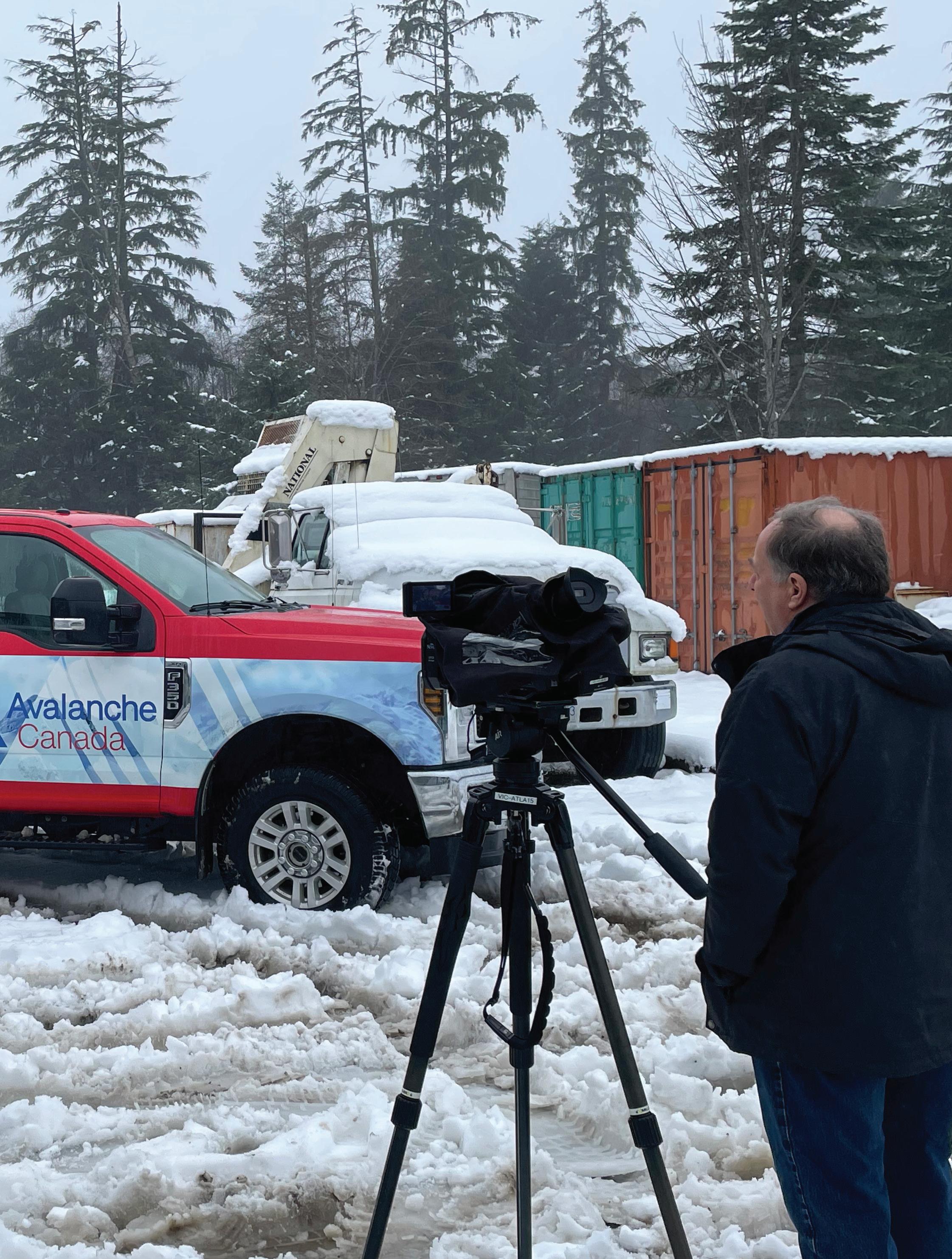
For the second year, we partnered with Destination BC to reach domestic and international tourists. The target demographic was inexperienced people looking to avoid avalanche terrain, so the content was how to recognize avalanche terrain. We selected images and provided text, and Destination BC shared the posts on their social media feeds. Through this partnership, we reached a huge audience of novice backcountry recreationists, as they have 1.2 million followers on Facebook and 640,000 on Instagram.
Traditional media remains a cornerstone of our communications strategy, where we deliver conditions reports, discuss avalanche safety, and promote our outreach events and training programs.
Our forecasters and field staff are all trained to share their expertise with the media throughout the season. We were featured in more than 8,000 print, online, and broadcast stories over the season. These numbers represent a decrease of about 38% from the previous year. Last winter was characterized by an unstable snowpack and several high-profile avalanche accidents, resulting in a dramatic increase in media hits and interviews. This winter was a lot more business as usual, and had a marketing or advertising equivalent of $18 million. Leveraging the media enables us to reach a wider audience, including backcountry users who may be unaware that our services exist. As expected, media hits increased around the Special Public Avalanche Warning, after fatalities, and in times of elevated snowpack instability.
Our digital communications strive for a balance between education and entertainment, and their purpose is to drive traffic to our website. We want content to be enjoyable and shareable, while also taken seriously.
We use social media to broadcast timely avalanche safety information, promote avalanche education, promote our products, services, and events, and foster relationships with the backcountry community. We consider posts successful if they have lots of shares and a big reach – the likes are secondary. Across our major channels, we had a combined reach of 750,000.
During prolonged periods of little change in conditions this season, we focused on staying creative in our messaging to keep users engaged and reinforce the basics of avalanche safety. We saw modest increases in our Facebook and Twitter followers.
We shifted focus away from TikTok, given uncertainty about its future in Canada, and continued to focus on our core channels. We had a combined total of 108,000 video views between Vimeo and YouTube.
MIN To Win Contest
Our weekly MIN to Win contest saw continued engagement this season. To encourage backcountry users to share observations, our team selected one MIN post winner each week, awarding a small prize thanks to our sponsors. We're excited to see posting MINs become a regular part of many recreationists' routines.
Quiz Time and Q&A
Our Instagram Q&A sessions remained popular, as did our Instagram quizzes about common avalanche forecast themes. Feedback shows these quizzes were especially helpful to newer backcountry users, and we're pleased to provide them with valuable content.
6.2 million

53,000
42,720
515,399
website page views unique users of our new app unique users of our website followers on Instagram followers on Facebook followers on Twitter
28,627

9,520

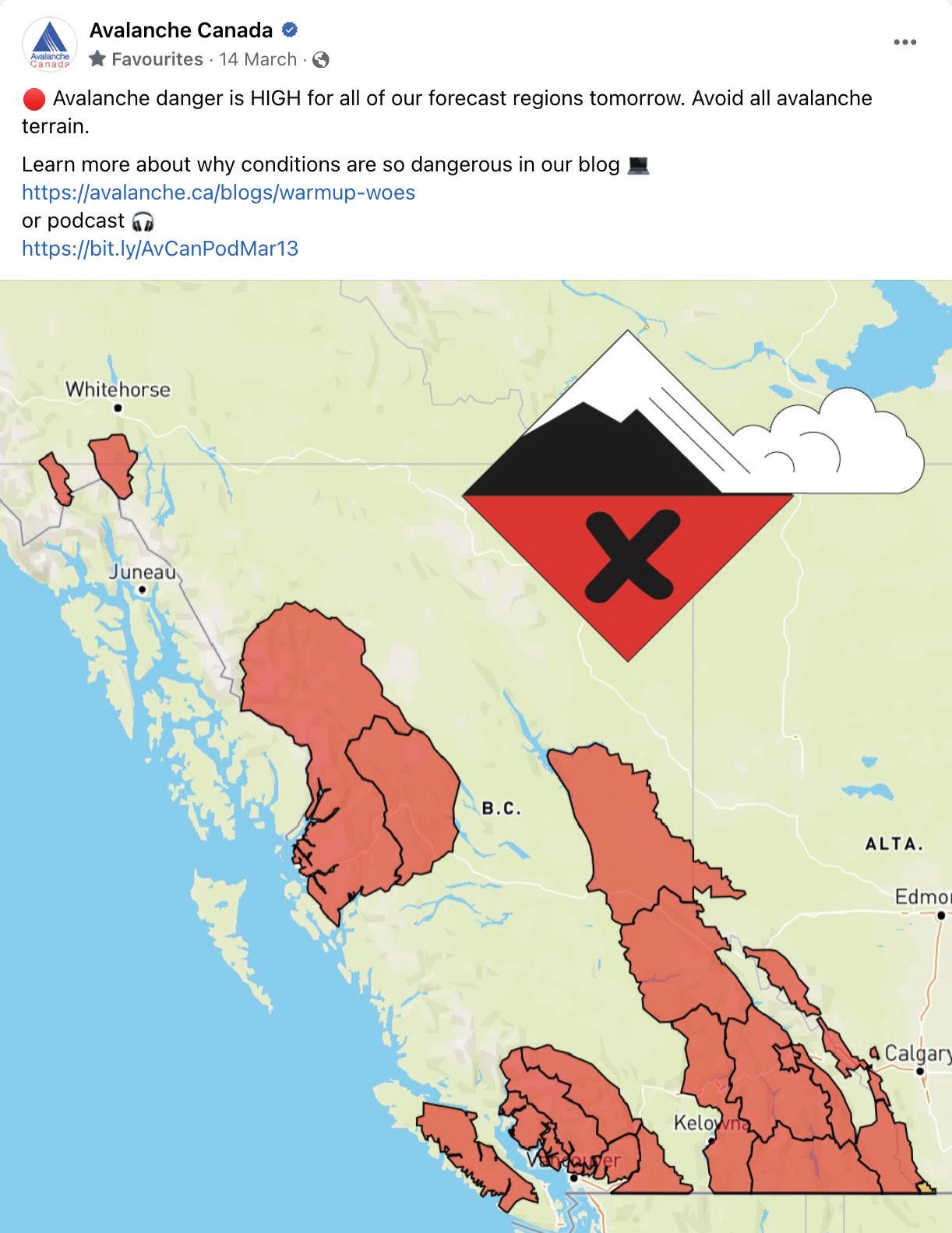

We partner with accomplished professional athletes to help spread awareness of our training, the Mountain Information Network, and forecasts to a wider audience.
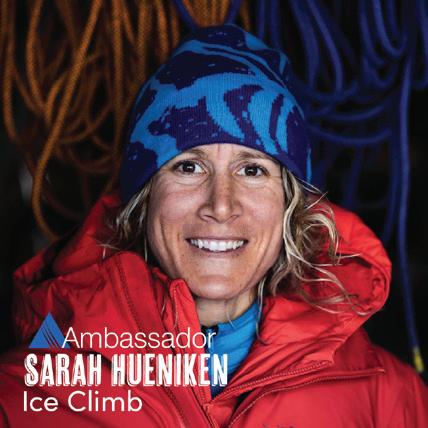
Sarah Hueniken @huens
Sarah has been a pioneer in women's ice and mixed climbing in North America and has guided in the Canadian Rockies for 16 years as an ACMG Alpine Guide. Her guiding company specializes in women-specific camps to build independence and leadership in the mountains. After losing a close friend to an avalanche while ice climbing, Sarah is now focused on raising awareness of avalanche risks for ice climbers and supporting healing. She founded the Mountain Muskox Peer Mentorship Program, and is sponsored by Arc'teryx, Scarpa, Sterling Ropes, and Onward Up.
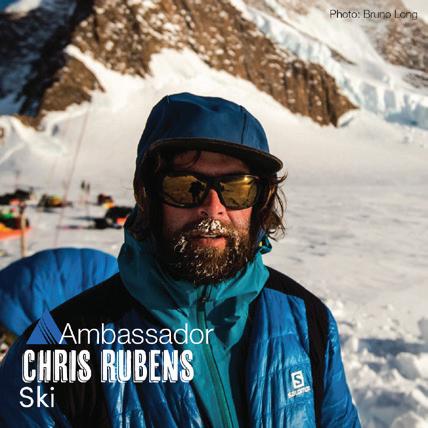

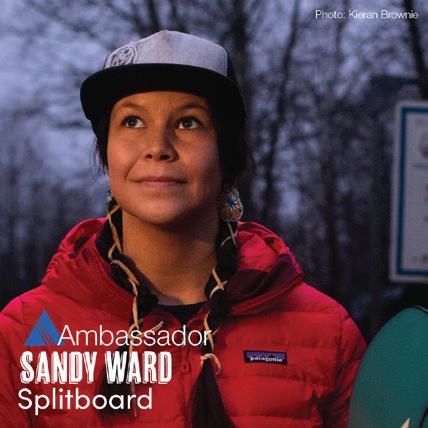
Chris Rubens @chrisrubens
Chris has been a professional big mountain skier for nearly two decades. Chris spends as much time as possible in the backcountry every winter, focusing on putting beautiful lines down mountains for both film and photo projects that align with his values. Four years ago, Chris became an organic farmer in Revelstoke, BC in order to support the sustainable food movement in his community. Chris is sponsored by Atomic, Picture Organic Clothing, Pomoca Ski Skins, and Revelstoke Mountain Resort.
Nadine Overwater @nadineoverwater
Nadine started sledding around the farm as soon as she could start one. She bought her first new sled in 2007 and moved to Revelstoke. Shortly after, Nadine starting guiding for Great Canadian Snowmobile Tours which began her path down the avalanche professional path. She’s a part-time guide, avalanche forecaster for industrial activities, delivers women’s riding clinics, and is a director of the Canadian Motorized Backcountry Guides Association (CMBGA). Nadine also works on various film projects for Ski-Doo and 509. She appreciates the freedom to do what she loves in the winter all while helping new riders realize safety is paramount and doesn’t limit the fun you can have in the backcountry.
Sandy Ward @sutik.maqa7
Sandy Ward is a member of the Lil’wat Nation and a founding member of Indigenous Women Outdoors. She has spent most of her life on snow as a competitive halfpipe rider, First Nations Snowboard Team coach, and now leader of the Indigenous Women Outdoors Backcountry Mentorship Program. Through her work with IWO and Indigenous Life Sport Academy, Sandy has continually shown her devotion to ensuring Indigenous peoples can get involved in the outdoors. Sandy spends every day of the winter in the mountains and has started gaining professional-level avalanche training as she works toward becoming a guide. Her sponsors include Arc’teryx, Protect Our Winters Canada, Jones Snowboards, Evo and Poc Sports.
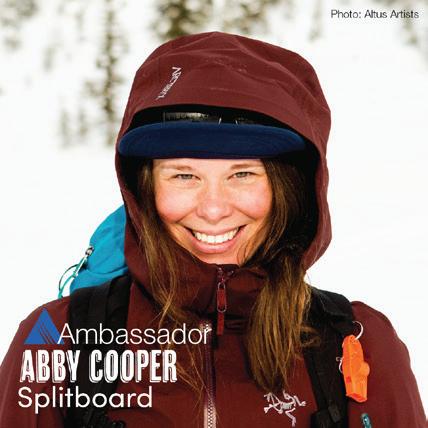
Abby Cooper @abbydells
Abby is a photographer and writer specializing in backcountry photoshoots and culture. She also regularly speaks at snow safety clinics and has created her own series of social events known as "Split Social,” aimed at educating and building a strong community for splitboarders, while instilling good communication between all backcountry users. Abby volunteers with Mountain Mentors and SheJumps and works with Wheelie Creative to increase female participation in the outdoors. Abby is supported both in front and behind the camera by Arc’teryx, Xtratuf, and Skidoo.

Khan Yong Gee @khanyonggee
Khan grew up on the sunny beaches of Australia, and started snowmobiling after moving to Whistler in the early 2000s. After purchasing a sled for access to backcountry snowboarding, Khan's passion for the sport only grew. He spent 15 years on the coast of BC, chasing deep powder and riding endless big mountain terrain, and now lives in Mabel Lake, BC, for its terrain and powder. His sponsors include Polaris Snow, Fly Racing Snow, Cheetah Snow, Raptor Shocks and Backwoods BMP.
This was our eighth year with a Youth Avalanche Ambassador Program, and our outstanding riders demonstrate a strong commitment to backcountry safety. Our youth ambassadors promote forecasts, training programs, Special Public Avalanche Warnings, events, and the Mountain Information Network, while also sharing their personal stoke and passion for the outdoors.
Mason Kenyon Stony Plain, AB @mason.kenyon

Alana Norie Kamloops, BC @alananorie


Avalanche Ambassador Abby Cooper finding some late season turns in the Whistler area. Image: Mitch Winton

One of the ways MEC supports increased accessibility to the backcountry is through the MEC Avalanche Safety Grant.
Thanks to MEC, four non-profit organizations serving IBPOC (Indigenous, Black, and People of Colour) communities were each able to offer an AST 1 course for up to eight students. Backcountry Access also contributed to this initiative by providing two boxes of safety gear.
The grant recipients for 2023-24 are:
• The Howl Experience (Bow Valley, AB): Providing transformative, barrier-free learning experiences for Indigenous, low-income, and marginalized youth.
• Indigenous Women Outdoors (Pemberton, BC): An all-Indigenous organization dedicated to igniting a spirit of empowerment, resilience, and connection among Indigenous women by providing them with the opportunity to explore and excel in outdoor sport activities.
• Incluskivity (Squamish, BC): Aiming to create an inclusive and psychologically safe space for IBPoC women and gender-diverse people to recreate in the backcountry with their peers.
• K8 Mountaineering Club of Alberta (Calgary, AB): A Filipino-Canadian Mountaineering Club aiming to support Filipino immigrant mountaineers through the healing power of the mountains.
We are thankful for MEC’s support in helping these impressive organizations provide avalanche safety education.
“I really appreciated being able to do the course with just our IWO crew because it definitely made the whole experience much less intimidating. Since it was a group I felt super comfortable with, I had no hesitations about asking any and all questions I had, which I think is super valuable for a course like this. It was a super positive experience and I'm super grateful to have had the opportunity to do my AST1 with IWO.”
Indigenous Women Outdoors AST 1 recipient
The Columbia Basin is home to a diverse group of backcountry users, and the Columbia Basin Trust (CBT) supports us in spreading avalanche awareness in the area.
Thanks to funding from the CBT, we delivered the Revelstoke Staying Alive Night outreach event in November with 250 people in attendance. We had presentations from avalanche forecasters, Revelstoke Mountain Resort Pro Patrol, RevSAR, Marty Shaffer from CAPOW Guiding, and Parks Canada. Thanks to Selkirk Tangiers Heli Skiing,, we gave away five Avalanche Skills Training (AST) courses to people between 16 and 30.
Another CBT grant allowed us to deliver avalanche and backcountry safety curriculum programs close to 3,200 K–12 students throughout communities in the Columbia Basin areas, an increase of almost 400 over last year.
The funding we received through the CBT grant has played an integral role in the success of our program. Since 2014, we have provided our core school program to over 32,000 students in Basin communities. We have also subsidized certified AST courses for over 400 students. This achievement is widely regarded as a tremendous success because it instills a culture of safety in the mountains at a young age.
This season, we were happy to grow the BOLD Backcountry Grant, created by our youth ambassador Alana Norie and supported by MEC. We are so proud to work with ambassadors like Alana who are working hard to create more opportunities for all youth to explore the outdoors.
The grant is designed to facilitate backcountry access for individuals who identify as part of the 2sLGBTQIA+ community. The grant supplied four recipients with essential avalanche safety gear, a backpack, and an AST 1 training course. As well as the fours grants, the program also supported a community day of touring guided by Extremely Canadian, and MEC funded additional AST spots to fill a course with participants who identify as 2sLGBTQIA+, as well as providing gear in support.

The primary objective of this grant is to promote inclusivity and reduce barriers to accessing the backcountry. We extend our sincere gratitude to BCA, Extremely Canadian, MEC and Canada West Mountain School for sponsoring this grant.
We were proud to work with Selkirk Tangiers Heli Skiing on two new initiatives to help support youth accessing the backcountry safely.
As backcountry use increases, so to does the number of young people exploring the mountains outside of managed riding areas. We know that young people often face financial barriers to entry in getting the gear and training they need to make safe choices when they recreate. In a bid to reduce these barriers, Selkirk Tangiers Heli Skiing generously donated funds and resources to facilitate a free youth AST 1 course in Revelstoke for ten youth. Five places were allocated during the Staying Alive avalanche safety event. The remaining five were filled by Revelstoke Secondary School students. The course was held at Revelstoke Mountain Resort and taught by Selkirk Tangiers Heli Skiing guides.
Selkirk Tangiers Heli Skiing also offered a youth grant open to people under 30 across Canada, which provided four young people with a transceiver, probe, and shovel, and an AST 1 course with an Avalanche Canada Training provider of their choice.
These initiatives were only made possible by the generous support of Selkirk Tangiers Heli Skiing and made a significant impact on the young people who received them. Working together, we’ll help young people make safer choices in the backcountry.
We work hard to secure grants, seek stakeholder support, collaborate with sponsors, and make every donation count. Ensuring continued access to vital public safety information and programs is a huge job that we can’t do alone; we appreciate all the help we get. We’re so grateful to all of the organizations and individuals who have dedicated time, energy, and resources towards making their backcountry community safer.
Through Outdoor Research's Community Partners program customers have the option to choose a community partner non-profit to receive a donation. This season, Outdoor Research contributed more than $6,500 to public avalanche safety. We are very grateful to Outdoor Research for including us as one of the recipients, and to the many people who opted to donate to us. They also donated a full outerwear kit for an Avalanche Canada Foundation prize draw and six parkas for the field teams.
The CrowSnow Riders, based in Crowsnest Pass, Alberta, donated $1,300 from their annual poker run to Avalanche Canada. The event attracted riders from Ontario, Manitoba, Saskatchewan, Alberta, and BC. The donation came from the proceeds of their raffle and supports our South Rockies field team. Thank you to CrowSnow Riders for their ongoing support.
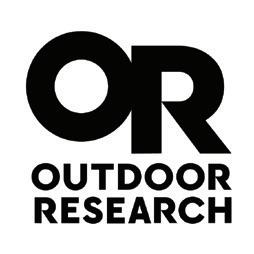

The Fernie Snowmobile Association has also been a stalwart supporter of our South Rockies field team, and this year the group donated nearly $1,000 after matching club donations.
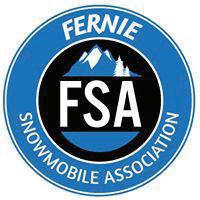
"The Fernie Snowmobile Association underscored its dedication to community support by matching rider donations for the Avalanche Canada South Rockies Field Team. This act highlighted the snowmobiling community's collective appreciation for a regional team that gathers crucial weather and snowpack data, instrumental in crafting accurate public safety avalanche bulletins for our valley.” Fernie Snowmobile Association
This is the third consecutive year that Ole Originals, a Vancouver-based clothing company, has designed shirts and hoodies for us, donating 25% of the proceeds to support our public avalanche safety programs. Ole Originals designs and prints retro-style and geographic-inspired graphics on high-quality garments. Designs are inspired by the outdoors, travel, wildlife, and the places we love across Canada. Ole Originals graphic artists created an Avalanche Canada design for their t-shirts and hoodies, available online.

In December, Coastal GasLink generously donated 50 sets of avalanche safety equipment and winter backpacks to Avalanche Canada's schools program. The gear, previously used by workers during the TC Energy pipeline project, includes avalanche transceivers, probes, and shovels, all in perfect working order and now repurposed for the school program.
“Coastal GasLink is thankful that this life-saving equipment can be used beyond our project’s needs,” says Tanner Moulton, Coastal GasLink Public Affairs Advisor. “This equipment was used by our workforce to keep them safe during construction in incredibly challenging terrain and now Avalanche Canada can utilize this same equipment to provide important life-saving education to youth in Western Canada. Partnerships like these are extraordinary and we look forward to the education and benefits that these will provide for years to come.”
Avalanche Canada’s school program offers free in-class presentations to students in Alberta, BC, the Yukon, and Newfoundland, supported by toolboxes containing avalanche safety gear for hands-on demonstrations. This donation doubled the number of toolboxes available, greatly expanding the program’s reach.
Thanks again to Coastal GasLink for this gift to Avalanche Canada’s schools program.

Avalanche Canada's Northwest Field Team with the generous donation of 50 sets of transceivers, probes, shovels, and backpacks. From
The Gordon Ritchie Service Award recognizes individuals or organizations who have demonstrated a significant commitment to public avalanche safety in Canada. We celebrate twenty years of service in public avalanche safety in fall 2024, and this year’s winner is Mountain Equipment Company (MEC), a business that has shown loyal, unwavering dedication since the very beginning.
It’s unusual for us to award it to a company; this is only the second time in our history. But this year it couldn’t be anyone else–we cannot overstate how important MEC’s support has been to public avalanche safety in Canada for two decades.
MEC has always shared our goal of educating more backcountry users about avalanche safety. As the presenting sponsor of our Avalanche Skills Training (AST) program, MEC helps more than 10,000 students per year learn critical avalanche safety skills. As well as supporting AST training, MEC also hosts avalanche awareness outreach events in their stores, amplifying and supporting our message and reach in major cities across western Canada. They also provide valuable gear for our staff and for outreach and fundraising initiatives.
They’ve also helped to increase accessibility to the winter backcountry through their support of the Avalanche Safety Grant, which supports non-profit organizations serving marginalized communities. The Avalanche Safety Grant funds four organizations to provide avalanche skills training for up to eight students each. We’re grateful to partner with MEC to reduce some barriers in accessing winter backcountry pursuits and enable even more Canadians to safely pursue outdoor adventures.
Furthermore, MEC is a proud supporter of our online avalanche safety tutorial AvySavvy. And their support is beyond monetary–MEC is an enthusiastic collaborator bringing great ideas to the table and our partnership has saved lives.
Over the last two decades, MEC has had a significant impact on the safety of Canadians travelling in avalanche terrain. We are honoured to call MEC a partner in our mission of improving public avalanche safety in Canada.

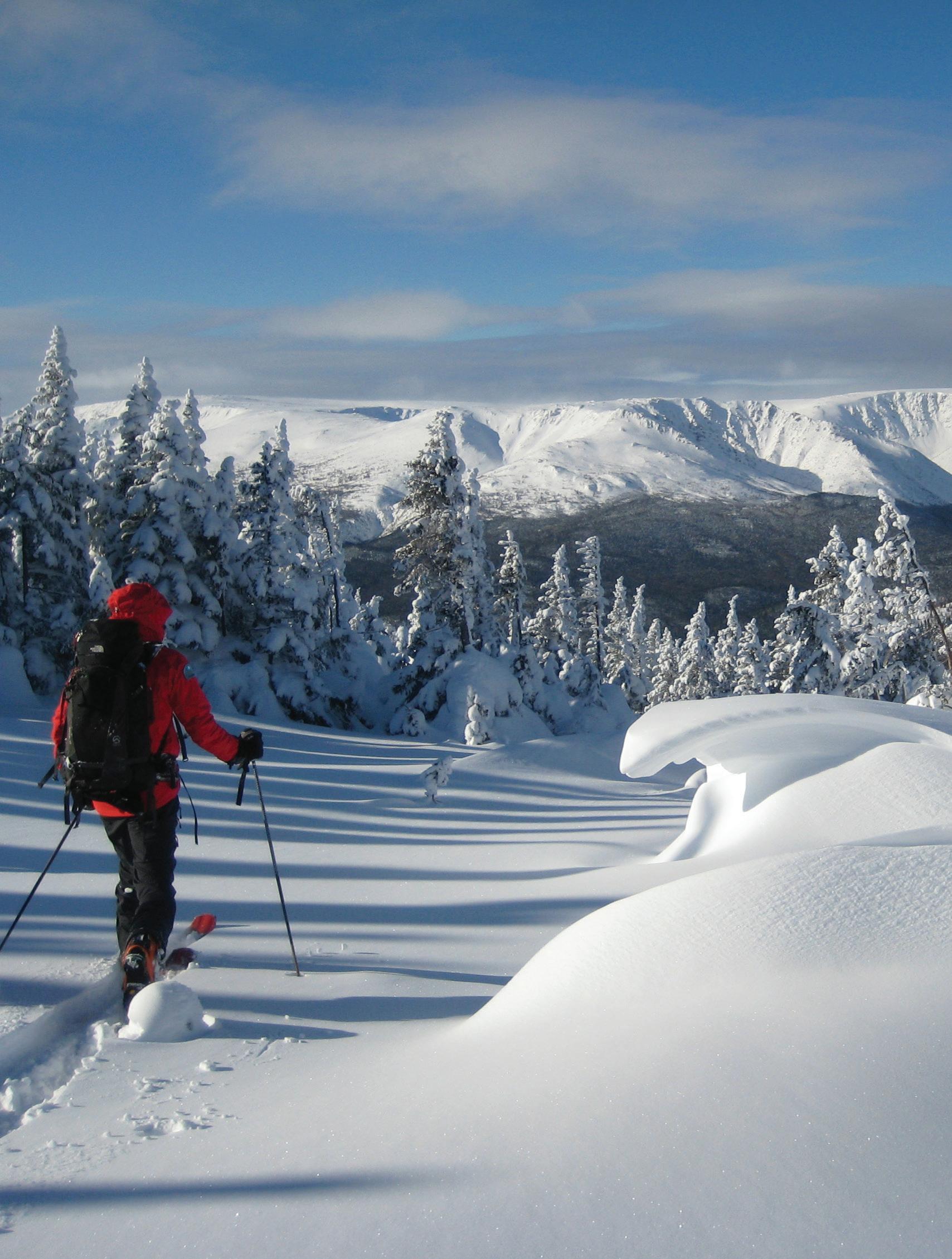
Avalanche Québec staff exploring the backcountry of the Chic Choc Mountains, in Québec's Gaspé region.
Image: Julie LeBlanc
We have a longstanding relationship with Avalanche Québec and we have worked closely with them over the years. Avalanche Québec is a non-profit organization with a mission to protect the public, prevent accidents, and improve avalanche safety in Québec through forecasts, training and outreach.
Founded in 2000 and based in the ChicChoc Mountains of the Gaspé Peninsula, Avalanche Québec administers Avalanche Canada Training programs in that province. This season, 1,027 students took an avalanche course in Québec.
The collaboration between Avalanche Canada and Avalanche Québec supports our national strategy to deliver essential avalanche safety services across the country and reinforces Avalanche Canada’s role as the national provider of public avalanche safety training.
We engage an Avalanche Québec staff member as an Avalanche Canada forecaster. We also contract them out to translate some Avalanche Canada products.
Our sponsors play a crucial role in enabling the success of Avalanche Canada's forecasters and field teams. Their contributions, both in-kind and through direct support, significantly enhance our operational capabilities and effectiveness. Here’s how various sponsors supported us during the 2023-24 winter season:
Garmin provides InReach devices and subscriptions, ensuring that our teams can stay connected in remote locations. This connectivity is essential for both safety and efficient data collection in the field.

BRP and Polaris provide us with loaner snowmobiles which let our field teams access terrain. These snowmobiles are used extensively by our forecasters and field teams. At the end of each season, we have the option to return or purchase these snowmobiles, providing flexibility in our operations.
FXR supplies a variety of essential goods for our operations, including boots, helmets, goggles, and other uniform pieces. These items are vital for the safety and comfort of our field teams during sled-based work. FXR's support helps ensure that our teams are well-equipped to handle the demanding conditions they encounter.
RWDI Consulting donates six subscriptions to Alpine FX weather modeling, a critical tool used by all our field teams and forecasting staff. This advanced weather modeling software enhances our ability to predict and respond to changing avalanche conditions, improving the accuracy of our forecasts and the safety of our operations.
Outdoor Research outfitted many of our field teams with high-quality parkas, particularly valuable during a winter marked by extremely cold temperatures. Teams in the Yukon, Northwest, North Rockies, and South Rockies regions benefited from this gear, ensuring they could operate effectively and comfortably in harsh conditions.
, BCA, and The North Face provide gear such as backpacks and transceivers, which we use primarily for fundraising purposes. We also purchase a significant amount of field team and forecaster soft goods from them at excellent prices. This dual approach helps us equip our teams while also raising funds to support our broader mission.
MEC contributes to our operations by supplying emergency kits, essential for the safety and preparedness of our field teams. These kits ensure that our teams are equipped to handle emergencies, further enhancing their ability to conduct safe and effective fieldwork.


The support from these sponsors is invaluable, enabling us to maintain high standards of safety and efficiency in our operations. Their contributions not only equip our teams with necessary gear but also allow us to leverage resources more effectively, ensuring we can focus on our mission of promoting safe backcountry travel and reducing avalanche fatalities in Canada.

Staying warm in an Outdoor Research parka during a cold spell in the North Rockies.
Mentorship is an indispensable and well-established pathway to success in the professional avalanche industry.
However, snowmobilers face barriers not typically encountered by the ski sector when it comes to accessing professional practice. As an organization with privilege and power in the avalanche industry, Avalanche Canada aims to help level the playing field by offering a snowmobile mentorship program. Last season we gave two mentees—one in the South Rockies and one in the North Rockies regions—the opportunity to build industry relationships while practicing fieldwork skills under the guidance of experienced avalanche professionals on our field teams. The program's intention is to enhance their confidence, prepare them for enrolment in professional-level courses, and enable them to assume leadership roles within the industry.
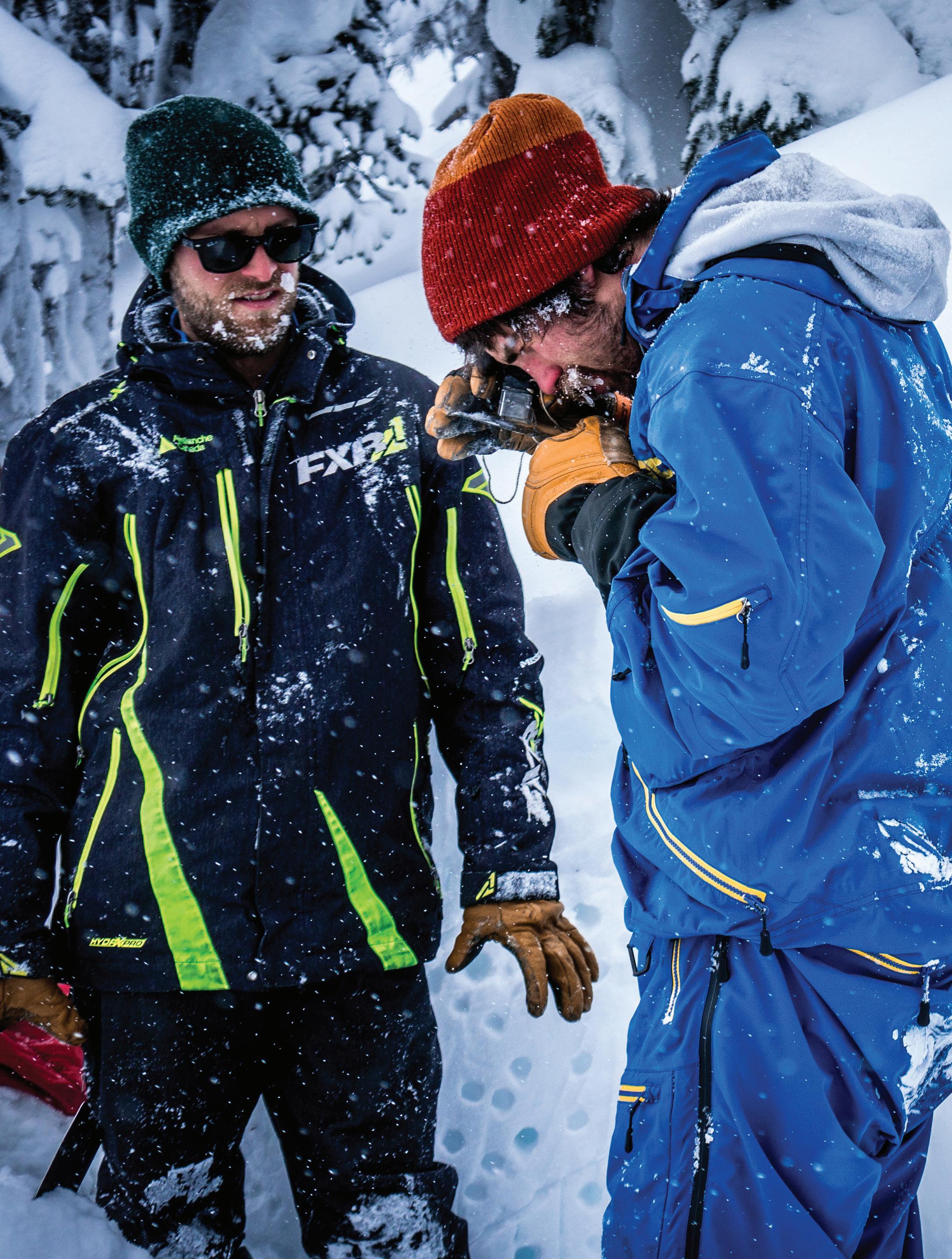

The first International Snow Science Workshop (ISSW) in five years took place in Bend, Oregon on October 8-13, 2023. Ten of our staff members attended, presenting research (3 oral and 8 poster presentations) and participating in numerous workshops and networking opportunities. This conference is a key way to stay up-to-date with new ideas and best practices in avalanche safety.
Avalanche Canada has six field teams in data-sparse areas in the South Rockies, North Rockies, Northwest BC, Yukon, Vancouver Island, and Newfoundland. Field teams gather snow, weather, and avalanche observations, which our forecasters in Revelstoke use to produce avalanche forecasts. We also have a roving field team based in Revelstoke who go where more information is needed.
Field teams are also integral to our outreach program, connecting with locals at trailheads and on mountain tops, at local events, and through their respective social media channels. Field teams regularly share videos and images to help communicate current conditions and terrain choices with local users. Field teams also play a big role in encouraging the use of our Mountain Information Network (MIN), and post regularly to it. Every single field team saw follower increases on Facebook and Instagram. They also conduct media interviews when conditions warrant.
Newfoundland & Labrador
Based out of Rocky Harbour, our field team gathered observations and provided local information through outreach events and social media channels to promote a culture of avalanche safety among the Newfoundland backcountry community. The team actively participated in community events, including the Snowmobile Safety Week in Cornerbrook. They also collaborated with BRP on a snowmobile outreach event.
We provided a weekend forecast for the Long Range Mountains from February 2 until April 6. These forecasts were available every Friday and Saturday for ten weeks, offering a crucial resource for locals to safely plan their backcountry adventures.
The North Rockies team works across a large and varied region that stretches from Valemount in the south to Chetwynd in the north. Based out of Prince George, team members gathered field data and met with community members throughout the region.
The team also conducted and attended a variety of outreach events, including a pre-season seminar with the Wells Snowmobile Club in Quesnel to answer questions about avalanche safety, promote our services, and build relationships with the community. They also attended the McBride Family Day event. The North Rockies team plays a pivotal role in promoting avalanche safety and fostering connections with the communities they serve.
Our Northwest BC field team is based out of Smithers. Their engaging social media posts, especially the Instagram reels, grew their dedicated following. The team’s active involvement in community events was instrumental in promoting avalanche safety awareness. They participated in the Smithers Snowmobile Association’s Avalanche Awareness Day where they conducted avalanche rescue games, answered questions about avalanche safety best practices, and built relationships with local backcountry users. The team also presented at events in Terrace and Smithers, including Bulkley Backcountry Ski Society’s Wxmen’s Day, and a fantastic Arc’teryx Northern Backcountry Connection event.
The team also hosted a webinar on terrain choice for snowmobilers.
The South Rockies field team is our longest-running field team. Established in 2011 and based in Fernie, the team has built up a loyal following on social media and helped develop a culture of backcountry safety in the region. The team works on both sides of the Great Divide, serving users in southern Alberta and southeastern BC.
The South Rockies team attended the Fernie Snowmobile Association’s Avalanche Awareness Day and the CrowSnow
Riders annual poker run again this season, helping run the transceiver and rescue stations. The team also participated in Fernie's winter festival Griz Days. The South Rockies team has developed a highly successful model for promoting a culture of avalanche safety through outreach and social media.
The Vancouver Island team is based out of Campbell River and supports forecasts and outreach efforts for Island recreationists. This team saw our biggest jumps in social media followers: a 52% increase on Facebook and a 29% jump on Instagram. This is a testament to their fun, informative content.
The team attended the North Island Snowmobile Association’s Snowarama and the Mt. Cain two-day Backcountry Fest where they answered questions about backcountry travel and coordinated transceiver rescue practice scenarios. They also occasionally attend events in Vancouver. As well as in person outreach, the team participated in many media interviews to educate about conditions and avalanche safety. Participation in these events enabled the team to deliver important safety messages to the Vancouver Island community. The team also hosted a webinar on terrain choice for skiers and contributed to podcast episodes..
The Yukon field team covers several popular backcountry areas in the southern Yukon and far northern BC. The three-person field team provides localized avalanche risk communication and outreach to communities in northern BC and Yukon, with a focus on the White Pass area. The team also regularly visits Haines Pass, a popular backcountry recreation area just 3.5 hours west of Whitehorse.
The team works hard on delivering engaging social media posts to educate and appeal to their diverse user group in the Yukon. Our Yukon team delivered an early season session at the Yukon Avalanche Association’s movie night to 155 people. The Yukon Government provides funding for this program, in collaboration with the Yukon Avalanche Association.
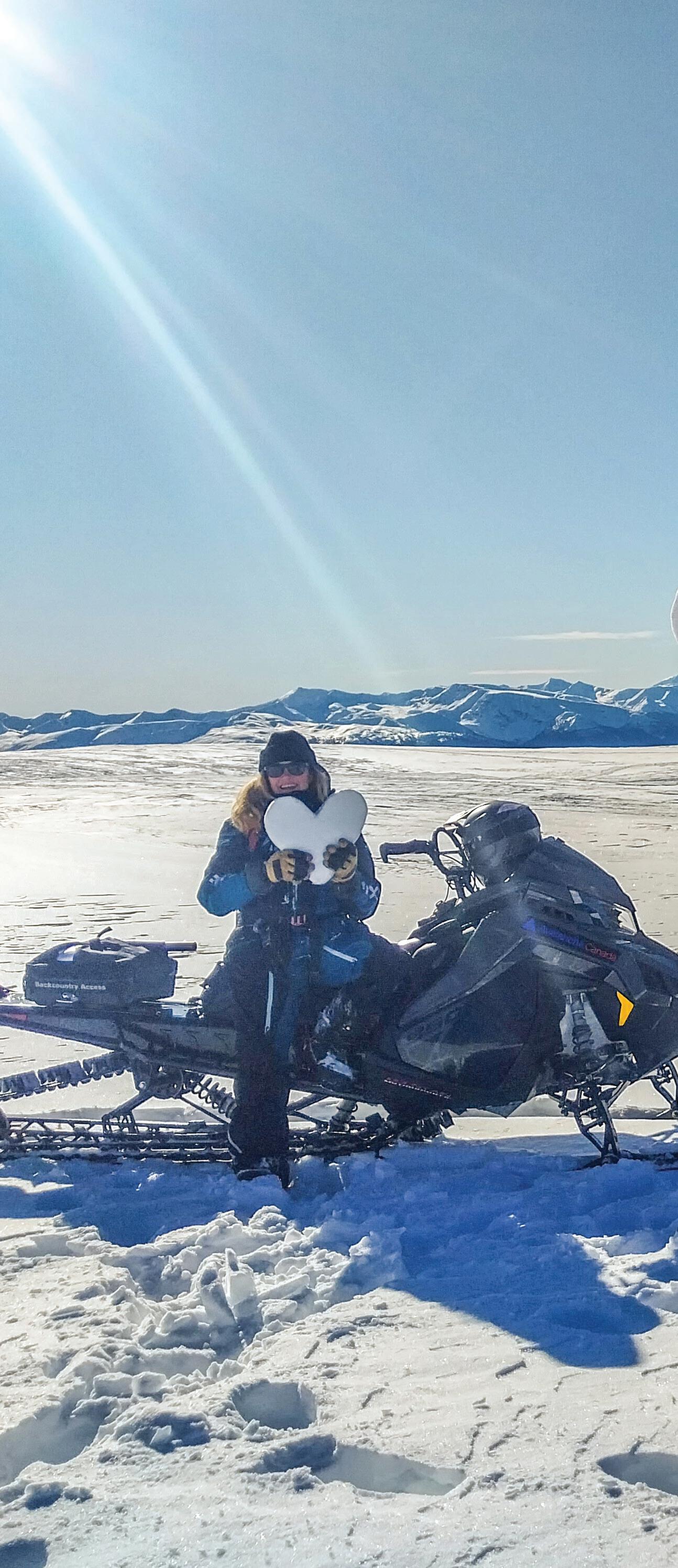
North Rockies
2,041 followers
South

followers
followers
followers
followers
followers
followers 1,521 followers 4,800 followers
followers
followers
Our developers are at the forefront of avalanche forecasting software and our services are in demand. In 2021, we formalized a collaboration with the Colorado Avalanche Information Center (CAIC) to co-develop forecasting software. In 2023, we developed a forecasting application software for the Colorado Department of Transportation with their collaboration and funding. The design and technology used in the highway forecast app served as a template for building an application to track persistent weak layers in the snowpack as they develop and evolve.
AvID (Avalanche Information Distribution) is our innovative software project to develop custom forecasting software and data visualization tools. We continue to develop new features, tools, and functions. The development is done in partnership with the CAIC and in collaboration with our forecasting partners, Parks Canada, Kananaskis Country and Avalanche Québec.
Our developers are working on enhancing avalanche forecasting through advanced data visualization tools in a project called AvObs. AvObs is the start of a much bigger multi-year, international collaboration with the CAIC on the next generation of forecasting tools. This is not only a strategic partnership but also a practical approach to sharing expertise, resources, and funding.

The Ice Climbing Atlas project is another layer of information sharing. We now display 24 ice climbs on our home screen map, marked by a unique ice climber pin. We’ve been able to build up our presence in the ice climbing community through this important project.
Each entry in the atlas analyzes and maps a popular ice climb, using the Avalanche Terrain Exposure Scale, and provides an overview of historical avalanche observations. Tracking avalanches is especially important for ice climbers, as their sport may have them in avalanche paths for extended periods of time. Knowing which paths have slid and when is an important addition to their safety practices.
Brainstorming features, tools and functions with CAIC users. Image: Kelsy Been
Professional climber and mountain guide Sarah Hueniken, who is also one of our ambassadors, and Grant Statham, professional mountain guide and visitor safety specialist with Parks Canada, are both leaders in the community and deeply invested in avalanche safety, and have been the project's champions. Members of Kananaskis Mountain Safety have been instrumental in providing information on climbs located in K-Country.
This year, users added 3,307 Mountain Information Network (MIN) reports to our website, which we count as a big win in a largely uninspiring season.
The MIN is for getting and sharing real-time, location-specific information about conditions, snowpack, avalanches, weather, and incidents. Reports are easy to upload and no special expertise is needed. The MIN is a real success story. It’s an important resource for decisionmaking for users, and our forecasters use observations shared with the MIN as part of their data-gathering workflow.
Through our MIN to WIN social media contests, we used prizes as incentives to encourage posting. Our field teams also regularly post to the MIN for their respective regions. They shared those posts across their social media channels, highlighting concerns in the snowpack while encouraging local users to view the data and submit their own observations.
The Mountain Weather Forecast is a muchloved resource on our website. Produced daily throughout the forecasting season by the Meteorological Service of Canada since January 2015, it’s one of the most popular pages on the site.
It’s essential to both professionals and recreationists, and to our avalanche forecasters. Thanks to MSC for the ongoing meteorological support.

We offered 58 days of avalanche forecasts for Haines Pass, beginning on March 2. The Yukon field team spent 15 field days in the area and avalanche forecasters from Revelstoke also visited to collect data. Haines Pass forecasting began as a pilot project in March 2023. It’s a collaborative effort between the Yukon field team, our forecasters based in Revelstoke, and the Haines Avalanche Information Center.
The popular backcountry area straddles the border between Alaska and the Yukon. Just 3.5 hours west of Whitehorse, it’s known for its prime backcountry riding terrain, and attracts backcountry users from Whitehorse and other communities in the Yukon.
This year we launched some improvements to the forecast layout. Though we’ve made lots of improvements to the back end, these are the first significant public-facing changes since 2011.
Users can now simply scroll to read all sections of the forecast, including the avalanche, snowpack, and weather summaries, without having to navigate multiple tabs. By combining all the information into one scrollable format, we hope to see an increase in the number of people who read all the available information, particularly among our less experienced users.
Forecasters can now include photos in the forecasts when relevant. Forecasters can clearly highlight avalanche problems, terrain and travel advice, and weather information with images.

Since 2004, when Avalanche Canada was established, our forecasters have relied on the professional avalanche information exchange known as InfoEx as our primary source of data.
InfoEx is a subscription service for professional avalanche operations in Canada that allows a daily online exchange of snow, weather, and avalanche observations. As a subscriber, Avalanche Canada accesses this reliable stream of highquality data, which then informs our understanding of the ever-changing snowpack across the vast and remote mountainous regions of western Canada. We’re also a contributor, and our field teams shared 375 daily submissions this year.
This season, our avalanche forecasters produced 2,371 forecasts from November 28 through to April 28.
Image: Abby Cooper
InfoEx has been administered by the Canadian Avalanche Association every winter since 1991. The InfoEx system, and its subscribers who provide their data daily, play an integral role in Canada’s public avalanche safety.

We support avalanche research to ensure that all programs, services, and materials are based on accurate research and evidence. In 2023, we created two new positions that emphasize a focus on research activities. The Research Officer plans and manages both internal research projects and our partnerships with academic institutions. The Visualization Design and User Research Specialist coordinates user research to inform the design of effective products.
We are also continuing our research partnership with Dr. Pascal Haegeli at Simon Fraser University’s Avalanche Research Program (SARP) by funding several projects and collaborating on important research questions. One specific project with SARP has been a study focused on avalanche awareness and safety practices among snowshoers and winter hikers. MSc student Griffin Slimkowich surveyed participants at trailheads in the North Shore mountains of Vancouver to learn about how they perceive avalanche risk and how it relates to their background, education, motivations, and terrain preferences. The results of this study will help us tailor our products to better reach the growing diversity of winter backcountry recreationists.
Our Research Officer has organized a new working group of international experts in numeric snowpack modelling to collaborate on ways of numerically forecasting avalanche hazards (AvaCollabra). This is a rapidly advancing field which will improve forecasting methods. Our Research Office also works on snowpack modelling development to assist our Avalanche Canada forecasters in their workflow.
One of the main limitations of numeric snowpack modelling is uncertainties in the inputs to the model, especially precipitation. SFU student Kelsea Krawetz has continued work on her Masters project where she is examining the strengths and weaknesses of different precipitation forecast products and how that impacts snowpack modelling.
Avalanche Canada Training courses are the national standard for recreational avalanche training.
Avalanche Canada Training (ACT) reached 10,773 students through our AST 1, AST 2, Companion Rescue Skills (CRS), Managing Avalanche Terrain (MAT), and the AST 1 Refresher courses.
Numbers decreased by about 12% from 2022-23 (apart from CRS which increased by 5%), but we can attribute that to the poor snowpack, which resulted in many cancelled courses, and a drop in ACT providers.
We develop the courses, which are then delivered by independent third-party providers, who are licensed by Avalanche Canada. We have 130 actively licensed ACT providers. This is a 20% decrease year over year, possibly due to increased costs such as insurance. We’re so grateful to our providers—they’re critical to the success of the ACT program.
Snowmobilers make up 10% of the overall AST 1 student numbers. We know there are many snowmobilers accessing the backcountry so we are striving to see that number increase. With the inception of the Canadian Motorized Backcountry Guides Association, we hope there will be a larger pool of ACT snowmobile providers to offer courses and influence the sled community at large to get avalanche training. We are also planning on working more closely with the British Columbia Snowmobile Federation to promote our tools, training, and resources.
AST 1 TEACHES THE FUNDAMENTALS OF AVALANCHE FORMATION, TRAVELLING IN AVALANCHE TERRAIN AND COMPANION RESCUE.
AST 2 INCREASES AND DEVELOPS KNOWLEDGE OF TERRAIN CHOICES, ROUTE FINDING AND DECISION MAKING IN AVALANCHE TERRAIN.
COMPANION RESCUE SKILLS A ONE-DAY COURSE OFFERING AN INTRODUCTION OR REFRESHER ON THE LATEST TECHNIQUES IN AVALANCHE INCIDENT RESPONSE.
MANAGING AVALANCHE TERRAIN A ONE-DAY COURSE FOR AST 1 GRADUATES, AIMED AT DEVELOPING MORE ADVANCED WINTER BACKCOUNTRY TRAVEL SKILLS.
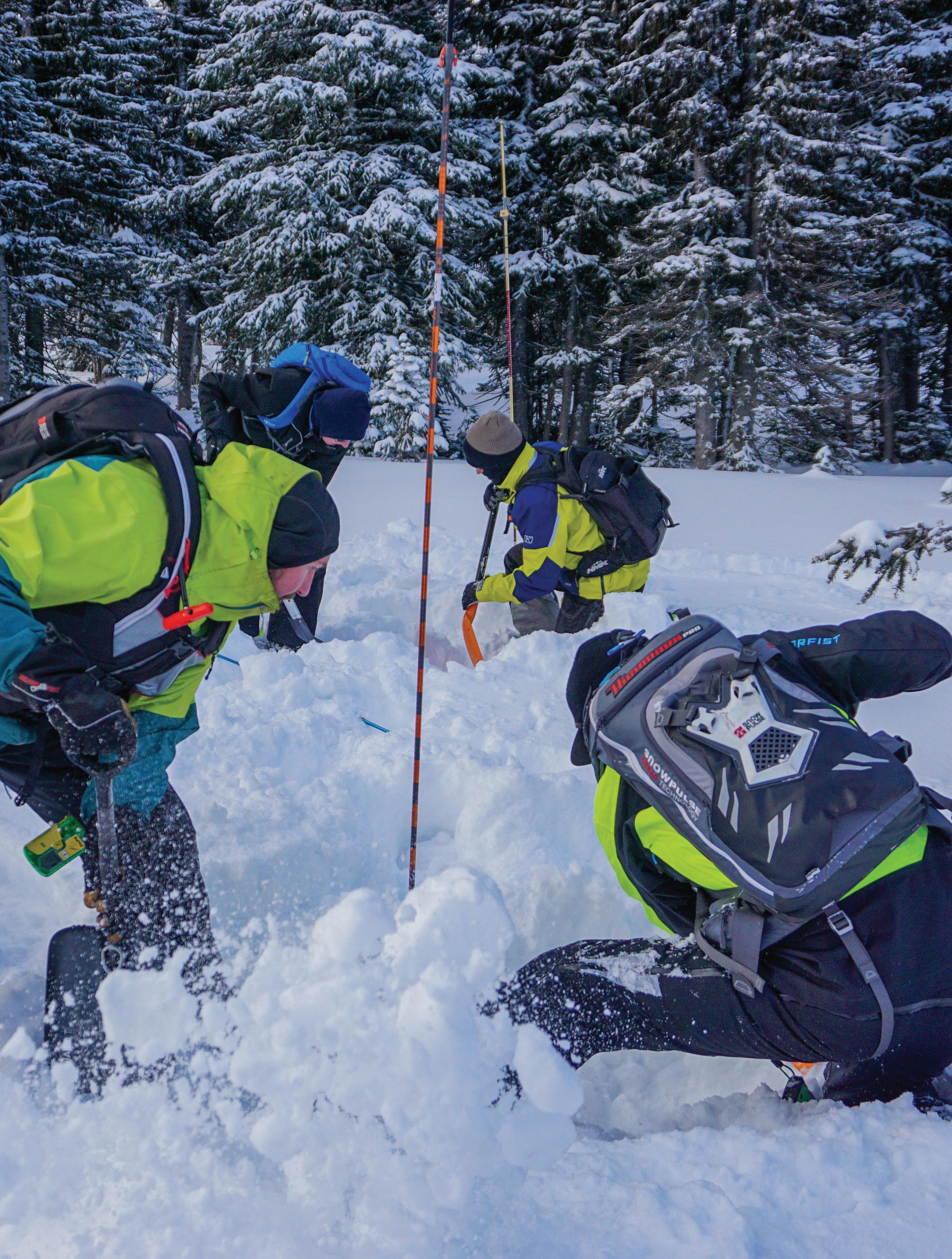
Participants in a sled AST 2 course in the Elk Valley work on companion rescue skills.
An AST 1 curriculum update was reflected in this year’s courses. The primary objective of this update was to ensure that the course content aligned with the AST Handbook, including the foundational concept of the Daily Process.
Our Education and Outreach Manager presented a poster at ISSW in Bend, Oregon in October 2023 about how we have adapted the AST 2 curriculum for motorized students. Highlights of the customized advanced training for snowmobilers include effective communication, snowpack tests and recognizing how snowmobiles affect snowpack layers, good travel habits in avalanche terrain, and advantages and disadvantages for rescue techniques.
We are proud of the work we have done on the motorized AST 2 curriculum and look forward to more students taking the training.
Our software developers built a brand new ACT Provider Portal this year to help streamline the ACT program. It allows providers to input their contact information, their instructor contact information, list their courses, and upload their licensing documents. This portal is connected to the public view of our website and offers users an organized, searchable platform to find ACT courses in their region, or within date or demographic parameters.
Over the past two years, Avalanche Canada has worked closely with the Canadian Avalanche Association to develop an “Educator” membership stream. Many avalanche professionals only want to instruct ACT courses, yet the path to CAA membership was complex for these potential educators. The CAA created and launched an online Foundations course that all new educators are required to complete. It also launched a beta course for the three-day Basic Avalanche Educator Terrain course. We see this new educator pathway as likely to help the ACT program grow in underserved regions and potentially with under-representated demographics like youth and snowmobilers.
We will continue to work with the CAA’s development team on the creation and launch of the Advanced Avalanche Educator Terrain course next winter.
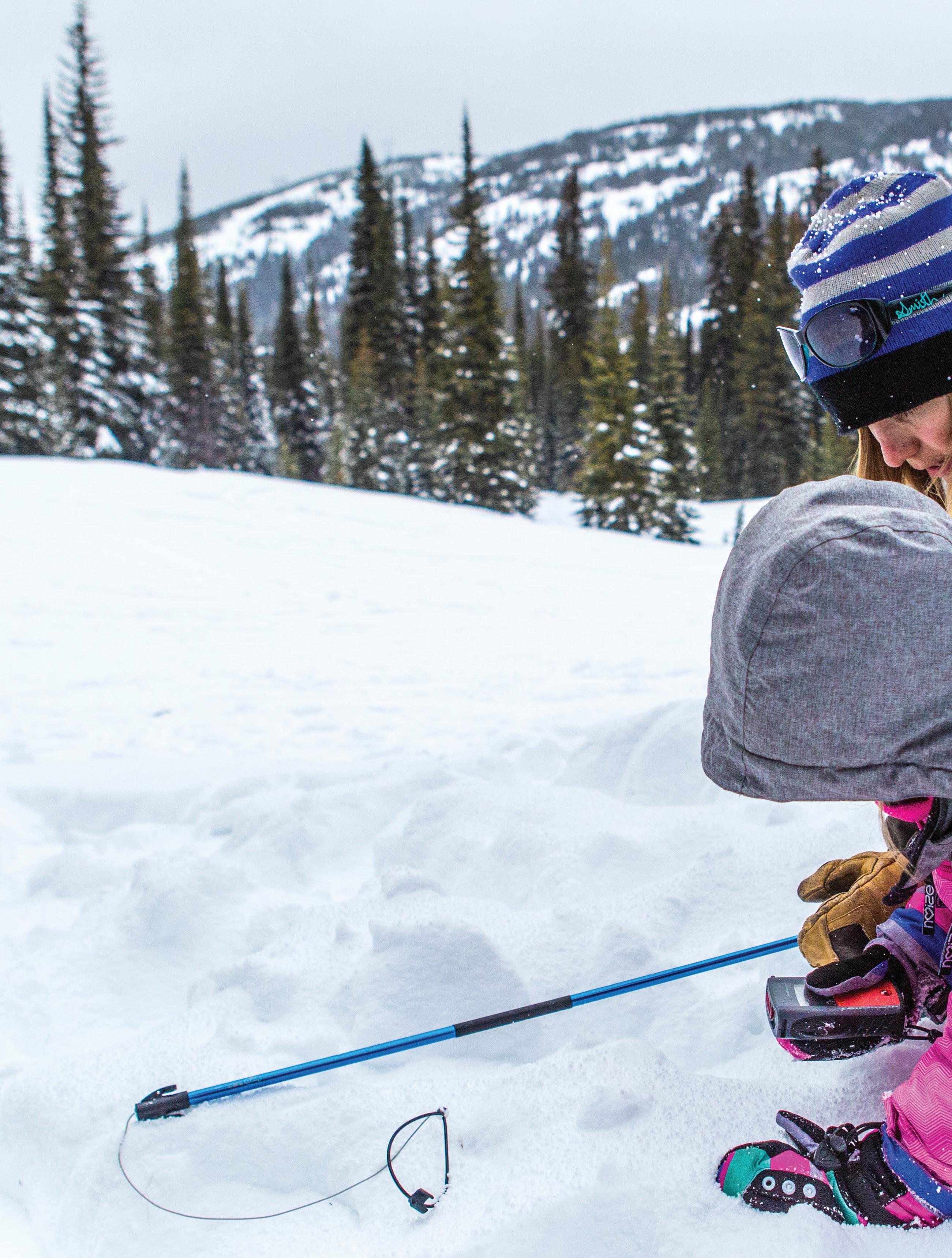
Our schools program aims to raise avalanche safety awareness among students in communities across BC, Alberta, the Yukon, and Newfoundland. The goal of this program is to deliver snow and avalanche safety concepts to K-12 students, ensuring they are aware of the risks and have the information to use their winter mountain environment responsibly. Youth programs are critical to fostering a cultural norm of backcountry safety and preparedness.
We reached almost 11,000 students this year, a new milestone for our in-school winter safety and avalanche awareness programs. This was our 17th year delivering the school program, reaching students from kindergarten to grade 12. We run programs in Alberta, British Columbia, Yukon, and Newfoundland. Our comprehensive programming includes interactive in-class theory as well as outdoor, hands-on rescue training.
We employed 15 staff and two program coordinators, our largest youth educator team so far. We had many returning instructors who continue to share their knowledge and enthusiasm delivering the programs to the schools. As well, we hired four new instructors to join our team in additional communities across British Columbia and Alberta.
We updated the kindergarten through grade eight theorybased classroom curriculum to ensure students receive the most relevant avalanche awareness education. We delivered programs in new communities and schools in southwestern Alberta, including Blairmore, Pincher Creek and Lundbreck.
We are so proud of our school program and grateful for the support of school districts and teachers.
"It was awesome! Students loved it and the balance of high engagement with facts and important safety messages is excellent." Jordan Hein, Lady Grey Elementary School, Golden BC
Reaching the youth in the South rockies. Image: Raven Eye Photography

Avalanche Canada reached 5,100 people during outreach events this year.
Thanks to our partnership with MEC, we started the season with events at the Calgary and Vancouver stores to reach a wide range of backcountry enthusiasts. Again, partnering with MEC, Avalanche Canada had outreach days aimed at the “unawares” demographic in both the Vancouver and Calgary stores in January and February. Our forecasters presented two different topics: “Recognizing Avalanche Terrain” and a case study pertinent to the region. All sessions were full house and our forecasters fielded lots of questions between presentations.
Though we do not host the Elk Valley Snow Avalanche Workshop (EVSAW), our team does an impressive job of organizing, acting as MCs, and presenting at this very popular early season event held in Fernie. 200 people attended this successful, day-long session.
Avalanche Canada attended two new outreach events this year. In mid-February we sent a forecaster to the UIAA Ice Climbing World Competition in Edmonton to highlight resources for ice climbers.
We also attended the Arc'teryx Backcountry Academy in Whistler in February with an info booth accessible to both attendees and the public. Our goal at these events is to educate people about how to access and use our products to prepare for a safe day in the backcountry.
Closer to home, we hosted our annual Staying Alive Night in Revelstoke in November. Kicking Horse Mountain Resort also hosts a Staying Alive Night in Golden. These early season events are critical to teach and inform new residents and visitors about avalanches and winter safety.
Avalanche Canada also participated in two events by the Revelstoke Snowmobile Club. There was a fatality and a very close call in their tenure, bringing a heightened awareness to the importance of backcountry safety.
Avalanche Forecaster and Research Officer, Simon Horton of Kimberley, BC, created a new outreach event: Kimberley Area Snowpack Update. Simon held two popular events that reached 180 people.
We thank everyone who helps organize, volunteers at, or attends in-person events. These remain an important pillar in our outreach efforts.

In April, we sent a member of our youth educator team, Drew Nylen, to Hopedale, NL, to provide avalanche awareness and training. The community, concerned about avalanches in their area, secured a federal grant to fund this initiative. We were thrilled to visit.
Located in Nunatsiavut in northern Labrador, Hopedale is bordered by avalanche terrain. Many residents, including youth, interact with this terrain regularly. Drew met with town council, search and rescue teams, firefighters, the RCMP, and held a public meeting. He also educated high school students in avalanche safety using transceivers, shovels, and probes, and delivered two avalanche toolboxes with eight sets of safety equipment.
Elected official Marjorie Flowers was instrumental in the project, securing the grant. She praised the training, noting that Drew's expertise and enthusiasm increased local interest in avalanche safety and education.
We look forward to continuing our collaboration with Hopedale and other northern communities to enhance avalanche awareness and training.

Avalanche Awareness Day event in Gaspésie, Québec. Image: Avalanche Québec
Avalanche Awareness Days
Avalanche Awareness Days (AAD) are held every January to promote avalanche safety through workshops, demonstrations, and family-friendly activities to increase awareness for those venturing into avalanche terrain.
We don’t host the events–they’re organized by other groups and venues like ski hills and snowmobile clubs, some for many years. We want to thank Fernie Alpine Resort, Apex Ski Resort and Fernie Snowmobile Association for donating funds raised during their event to Avalanche Canada. These donations support our core services.
This year, 23 venues held events, which was a bit fewer than normal. Some were cancelled due to lack of snow, poor weather, or a combination of both. Nonetheless, we view every event as a win. These grassroots events can have an important ripple effect on someone’s future backcountry experience and safety. We love the community support from all the organizations involved.
Our Snowmobile Outreach Coordinator Brent Strand gets people revved up about safety.
He attended both the Alberta Snowmobile Association’s (ASA) Sled Show in Edmonton in October and the Saskatchewan Snowmobile Association’s (SSA) Sled Show in Saskatoon in November. At these events we delivered a presentation targeted towards snowmobilers about all the resources available to them on our website.
We appreciate being able to connect with the public and our important allies in delivering safety messaging: the ASA, the SSA, and the BC Snowmobile Federation. These organizations connect us with their clubs throughout the western provinces and help augment our messaging to the snowmobile demographic.
In 2023-24, we began writing scripts and filming segments for a new series of short videos aimed at mountain snowmobilers. These will be used for social media, outreach, in schools, and during snowmobile Avalanche Canada Training courses. In 2014, we released Throttle Decisions, a popular avalanche awareness video series for snowmobilers. Now, the footage is becoming dated and we are updating it with modern machines, updated terrain and travel advice, and shorter segments in order to facilitate easier sharing and learning. We will continue this work over the 2024-25 winter season for release the following year.

Snowmobiles are vital for our work, allowing field team members and forecasters to travel large areas like in this photo from the Sea to Sky area. Image: Mike Conlan

Our avalanche forecasting program covers the largest area in the world. Snowmobiles let our field teams access huge amounts of terrain in a day, where they gather data used to produce avalanche forecasts.
Snowmobiles are also important for outreach initiatives. Field team members make direct connections with backcountry users at cabins, staging areas, trailheads, and popular backcountry locations to talk about snowpack conditions and promote avalanche safety practices in the field.
For more than a decade, the International Snowmobile Manufacturers Association has arranged loaner mountain snowmobiles for our field team, forecasters, and outreach staff to use throughout the season. This program has been invaluable as we have built up our own fleet.
For the 2023-24 winter season, BRP Ski-Doo generously supported us by loaning two 2024 BRP 850 Summit Edge 165 snowmobiles from Banner Recreation & Marine in Golden, BC. We also purchased a 2024 BRP 850 Summit Adrenaline Edge as the grand prize in the Avalanche Canada Foundation’s Braap It Up fundraiser.
Polaris has loaned us a snowmobile each winter since 2012. Last season they generously loaned us a 2024 850 RMK Khaos Slash 163 from Mountain Motorsports in Golden, BC, which we have since purchased.
The steadfast support of these organizations has been instrumental in enabling our fieldwork, which is essential to our forecast and outreach efforts.
Our snowmobile committee (Sled Com) helps us better understand and serve the needs of snowmobilers. Established in 2009, Sled Com has been a voice for the snowmobiling community, giving us valuable feedback, networking opportunities, and suggestions on snowmobile-specific training and programming. Sled Com members represent the greater snowmobile community. Thanks to the following who contribute their time and energy to this initiative:
Brent Strand (chair) Trish Drinkle
Marty Anderson Brittney Dickson
Lisa Block Curtis Pawliuk
Gen Byl
Avalanche Canada works with the following provincial snowmobile organizations:


Twelve people died in avalanches in Canada in eight separate incidents during the 2023–24 winter season. The 10-year running average is 10.9.
Of the fatal avalanche incidents this season, six were in British Columbia, three were in Alberta, and three in Quebec. The victims comprise of four snow bikers (33%), two snowmobilers (17%), two backcountry skiers/snowboarders (17%), three mountaineers (25%), and one ice climber (8%).
One fatal incident, involving three snow bikers, with no avalanche safety gear occurred in a remote location without a public avalanche forecast. In another incident, a solo traveller was found with their transceiver turned off. The final fatal incident of the year involved three mountaineers who were also not wearing transceivers.
These show us there is continuing work to be done on making sure that everyone recreating in avalanche terrain has the necessary avalanche safety equipment (transceiver, shovel, and probe), knows how to use it, and knows how to safely travel through avalanche terrain to minimize exposure.
We acknowledge the losses to the families, friends, and communities affected by these tragedies.
How do we measure the effectiveness of our public avalanche safety programs? While fatality numbers may seem like an obvious metric, they don’t convey the full story. We have no way of knowing the total number of backcountry users and without that number, we cannot accurately determine the true accident rate.
Although we feel confident in attributing this success to increased education and the coordinated avalanche safety services Avalanche Canada provides, it’s important to recognize that fatalities alone do not represent the sole measure of achievement. Other metrics demonstrate the success of our programs this year: high enrolment in Avalanche Canada Training courses, the success of our webinar series, contributions to the Mountain Information Network, increases of our social media following and website views, and more.
Observing a long term decline in avalanche fatalities is encouraging and confirms that our work is making a difference. Through awareness and education, we continue to encourage the respectful and responsible use of Canada’s mountain terrain.
Revenues $5,177,691
$5,177,691
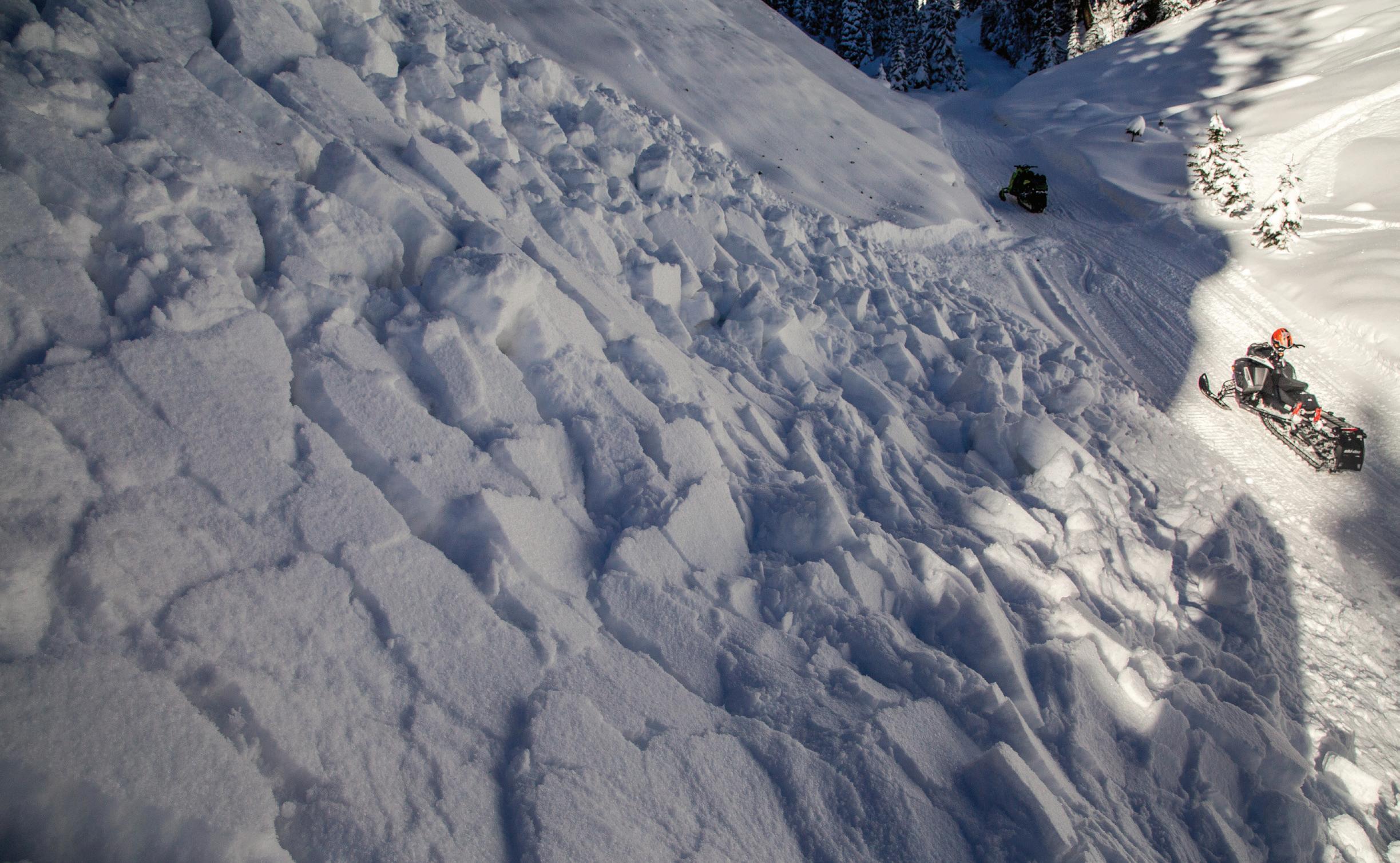
Our partnership with Avalanche Canada is vital as our customers and employees are venturing into the backcountry now more than ever. As we grow as a brand and the number of backcountry users steadily increases, the data, insights, and information our avalanche forecast partners provide are essential to keep our community safe in the mountains.
Dan Mayers, Brand Communication Manager, Outdoor Research
The Howl Experience is dedicated to creating experiential opportunities for BIPOC youth to engage in reciprocal relationships with the outdoors. Avalanche Canada’s commitment to safety and inclusivity aligns perfectly with our mission, empowering our participants to confidently and safely access the backcountry and to deepen these relationships.
Adam Mertens, Director of Recruitment and Risk Management, The Howl Experience
We absolutely enjoyed having Drew [Nylen] here with us [in Hopedale, NL]! He is an awesome presenter and all groups he met with were educated well by his knowledge and keen interest in avalanches. He certainly sparked an interest in some residents to train more on this topic and what to do should an avalanche occur in our community. We are very interested in further training in avalanche education.
Marjorie Flowers, Elected Official, Hopedale Town Council
Avalanche Canada is grateful for the support of the following government ministries and departments:


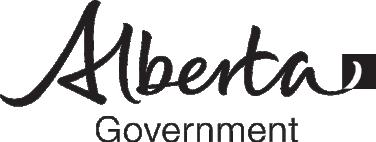

Government of British Columbia
Ministry of Transportation & Infrastructure
Emergency Management BC
Ministry of Public Safety and Solicitor General
BC Coroners Service
Ministry of Tourism, Arts, Culture and Sport
Gaming Grants
Ministry of Forest Recreation Sites and Trails
GeoBC
Ministry of Environment and Climate Change Strategy
BC Parks
Ministry of Citizens' Services
DataBC
Ministry of Emergency Management and Climate
Readiness
Interior Health
Government of Canada
Environment Canada
Meteorological Service of Canada
Parks Canada
Ministry of Public Safety and Emergency
Preparedness
National Search and Rescue Secretariat
Government of Alberta
Ministry of Environment and Protected Areas
Government of Yukon
Department of Community Services
Our sponsors are essential to public avalanche safety in Canada. We rely on sponsor funding for our Public Avalanche Warning Service, public outreach, and many of our education programs.
Program Partners
Premier Sponsors
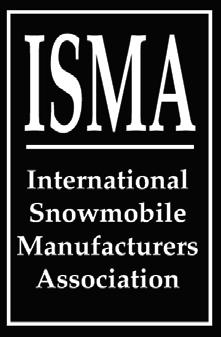



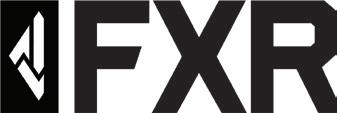











Image: Lyle Grisedale Looking Forward
During the 2024–25 season, we will begin two new internal research projects. These include launching a user research panel to solicit backcountry user feedback, experiences, and insights into our products and services, which we will use to improve how we communicate with the public. You’ll find more information on that project on our website this winter, and we welcome your participation.
Our field teams will also be conducting research on snow compaction under snowmobiles. This research may help inform travel advice in avalanche terrain for snowmobilers.
With funding from a Search and Rescue New Initiative Fund (SAR NIF), we are on year two of a three-year project to revamp, update, and digitize the fatal avalanche accident database. The Fatal Avalanche Incident Archive will offer detailed information about fatal avalanche incidents in Canada to promote reflection and learning. This online resource aims to provide insights and understanding of trends through expert analysis with the intention of reducing future fatal accidents.
The Avalanche Terrain Exposure Scale (ATES) is a terrain classification system aimed at communicating the complexities and risks of travelling in avalancheprone terrain. Avalanche Canada has been rating terrain using the Avalanche Terrain Exposure Scale for over a decade. Simon Fraser University successfully applied for a three-year SAR NIF grant to use a computer-generated method to map avalanche terrain using ATES, We are the implementation partner on this project. This will greatly enhance decision making tools like our Online Trip Planner, which combines the daily danger rating with a local ATES rating to give users real-time and relevant risk-management guidance.
Executive Director
Gilles Valade
Program Director
James Floyer
Product Manager
Grant Helgeson
Financial Controller
Breeana Hartley
Communications Manager
Karilyn Kempton
Digital Content Manager
Sarah Taylor
Education and Outreach Manager
Nancy Geismar
Snowmobile Outreach Coordinator
Brent Strand
Youth Education Manager
Shannon Werner
Tech Lead and Senior Developer
Bryce Schroers
Software Developers
Russell McWhae, Cameron Dunning
Visualization Design & User Research Specialist
Stan Nowak
Procurements and Grants Coordinator
Jennifer George
HR Coordinator and Finance Assistant
Amy Erving
Forecast Program Manager
Ryan Buhler
Field Program Manager
Jennifer Coulter
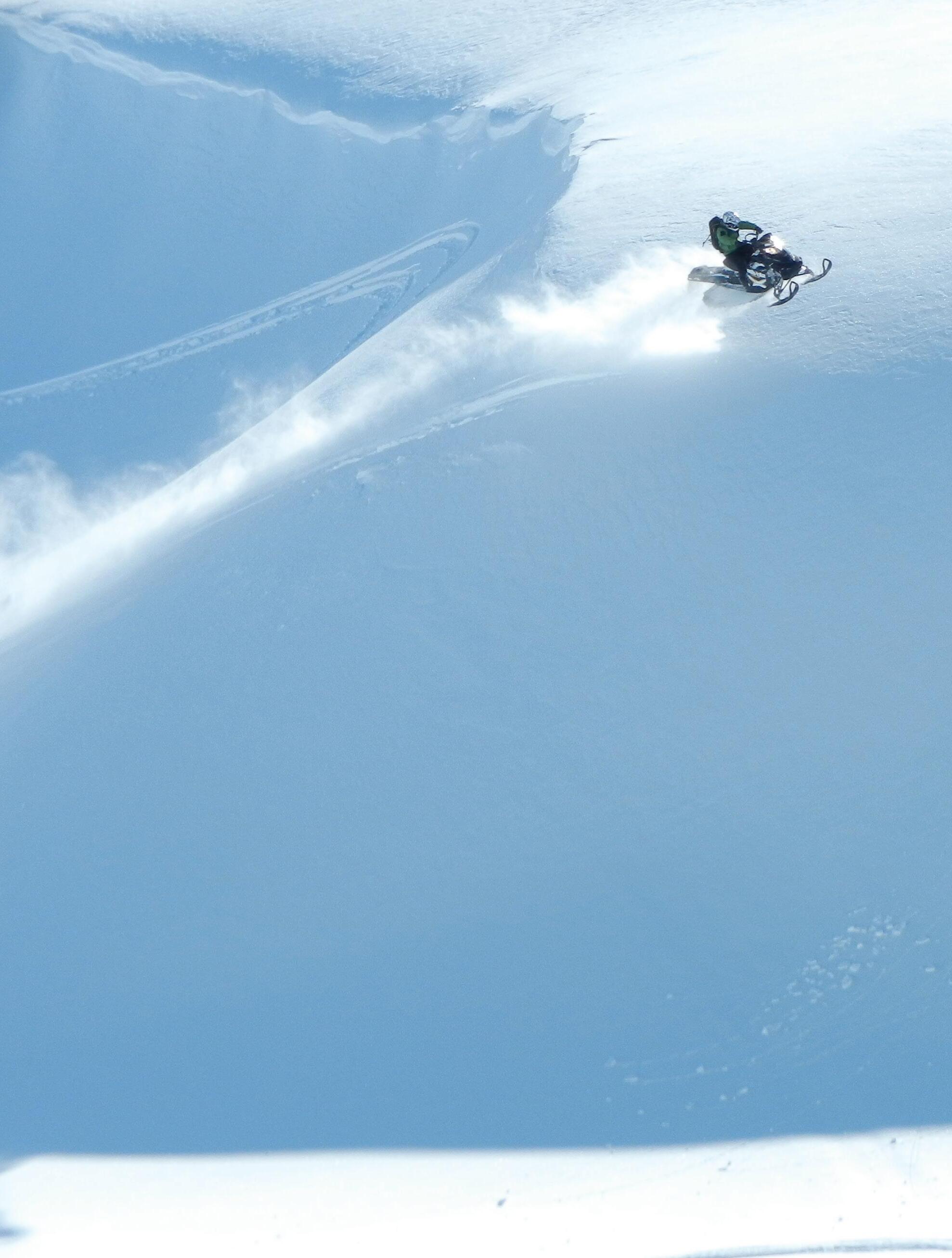
Research Officer & Avalanche Forecaster
Simon Horton
Equipment Manager & Avalanche Forecaster
Mark Bender
Avalanche Forecasters
Lynnea Baker, Brad Christie, Mike Conlan, Ross Goddard, Arienne Hanna, Wendy Lewis, Jesse Percival, Tyson Rettie, Zoe Ryan, Diana Saly, Josh Smith, Ian Snowsell
South Rockies Field Team
Lisa Larson (Lead Field Technician), Leslie Crawley, Duncan Maisels
North Rockies Field Team
Ben Hawkins (Lead Field Technician), Paul Kehler, Kat Halik
Yukon Field Team
James Minifie (Lead Field Technician), Cody Erickson, Brad Halt
Vancouver Island Field Team
Colin Garritty (Lead Field Technician), Karina Bakker, Jarek Barwise
Northwest Field Team
Lucas Holtzman (Lead Field Technician), Martina Halik, Emily Jones
Newfoundland & Labrador Field Team
Peter Thurlow (Lead Field Technician), Andy Nichols
Youth Educators
Colin Adamson, Heather Allen, Ricardo Assuncao, Kate Bell, Michelle Brazier, Claire Clarkson, Abby Cooper, Niki Foley, Ed Garlinge, Emily Jerome, Tyler Knowles, Madeline Martin, Drew Nylen, Oscar White
Administrative Assistant
Veronique Maillard
Property and Building Upgrade Manager
Vincent Jauvin
The board is composed of dedicated volunteer directors who are all committed to and passionate about supporting Avalanche Canada’s work. Throughout the year, the board remained actively engaged, meeting in person twice and conducting five online meetings. Additionally, the board’s executive and finance committee met 13 times and the governance committee met six times.
The board of directors is composed of individuals with complementary skill sets. It is tasked with the overall governance of Avalanche Canada. Directors are involved in the strategic planning, fiscal oversight, and to make sure we fulfill our mandate. Their priority remains our long-term sustainability.
Board of Directors
President
Catherine Angus is a founding partner of Catalyst Advisory Consulting. She has more than two decades of experience in management consulting delivering strategic planning, project advisory, and HR services across a diverse set of sectors. Catherine holds the Institute of Corporate Directors designation (ICD.D). She has a multidisciplinary education, with a BSc and BPHE from Queen’s University, MBA from the University of Calgary, and a Certified Management Consultant (CMC) designation.
Vice-President
William Jackson has an undergraduate degree in Electronic Systems Engineering and an MBA. He has worked in a variety of roles focused on the use of information and technology to create business value over the last 15 years and is currently a Director of Research and Innovation in the broader BC Public Sector.
Treasurer
Mike McMynn is a chartered professional accountant who has worked in both an accounting firm focusing on small businesses, including not-for-profit organizations, and in the oil and gas industry. His experience over the last 10 years includes tax, financial reporting, organizational structures, governance, and team management. Mike is currently the controller of an oil and gas services company based in Calgary, Alberta.
Secretary
Jeremy Shier is a designated accountant with expertise in financial management and HR within the not-for-profit sector. Jeremy has spent much of his career in operations management within various service sectors across Canada, and is currently in the role of manager of administrative services at the Britannia Community Services Centre Society, located in East Vancouver.
Directors
Christie Campbell
Kelly Gingles
Chris Pawliuk

Kevin Seel
Kevin Williams

Our 2023 – 24 season was filled with plenty of high fives despite a slow start with below average snowfall. We kicked off the year with our Braap It Up campaign, which is always an exciting fundraiser that helps us reach the snowmobiling community with our message. As promised, we hosted our first in-person fundraising event in Calgary since 2019. It was certainly more work than we remembered but the team did an outstanding job, putting on a successful fundraising event that allowed us to engage directly with our community.
The Arc'teryx, Outdoor Research and Mammut online prize draws were also highly successful, and we introduced new initiatives, like our Giving Tuesday campaign. These efforts raised essential funds, generated public enthusiasm, demonstrated our commitment to public avalanche safety, and expanded our impact across Canada. A heartfelt thank you to our donors for your continued support and to the over 1,500 new donors contributing to the cause.
These successes wouldn’t be possible without the hard work and support of Avalanche Canada’s staff, our board of directors, our sponsors, and our Executive Director Jeff Storck. Jeff hit the ground running and helped us surpass our fundraising goals. I can’t say it enough, but donations to the Avalanche Canada Foundation go well beyond keeping the lights on at Avalanche Canada. They are crucial for expanding programs, enhancing safety through research, and supporting initiatives not covered by Avalanche Canada’s federal and provincial funding. Donations help us expand our reach and impact by bringing more education programming to schools, bolstering outreach initiatives, and supporting research.
We’ve made significant progress on our journey, but there is much work ahead. While a substantial portion of Avalanche Canada’s operational costs are currently covered by government grants, those funds are not sufficient to cover the entire budget. These grants also come with conditions, such as the requirement to continue fundraising to complement government funding or limitations on how and where the money can be used. Together, we have the power to make a lasting impact on public avalanche safety. I invite you to join us, whether as volunteers, donors, or advocates, to build a future where everyone who ventures into the mountains does so with the knowledge and confidence to navigate avalanche terrain safely. Please renew your support with a donation.
We truly believe in what we do and every donation makes a difference—just like the difference that those unexpected, deep days in March and April made in your 2023 – 24 season.
Wishing you all a safe, snowy, and fulfilling winter season ahead.

Fabian Karg, President

Image: Wren McElroy

As I reflect on the past year, I am filled with immense pride and gratitude for our incredible community of donors, volunteers, and partners who have made this year a resounding success. Your unwavering support and dedication to public avalanche safety have propelled us to new heights.
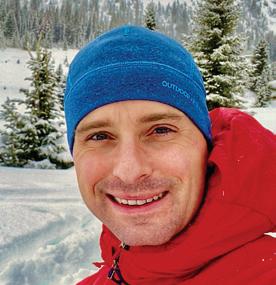
This year, we welcomed over 1,500 new donors into our community, a testament to the growing awareness and commitment to our cause. Thanks to your generosity, we exceeded our fundraising goals, ensuring that we can continue to provide essential resources and education to those who need it most.
Our fundraising events were a remarkable success. The Braap It Up, Arc’teryx, and Mammut online prize draws garnered enthusiastic participation, while our in-person event in Calgary brought together a passionate group of supporters. These events not only raised critical funds, but also strengthened our sense of community and shared purpose.
We are particularly proud of the launch of our new website, which has enhanced our ability to connect with our supporters and share vital information. The Avalanche Canada Schools Program saw unprecedented success this year, with more funds raised and more youth served than ever before. Through the generous donation of transceivers, we were able to create additional toolboxes, further equipping our youth with the knowledge and tools to stay safe in avalanche terrain.
Our Giving Tuesday campaign was another highlight, showcasing the incredible generosity of our donor community. Your contributions made a significant impact, enabling us to expand our programs and reach even more individuals.
Looking ahead, we are excited about the opportunities that the coming year holds, and we look forward to raising more money through online sweepstakes. We are diligently working on a three-year strategic plan to solidify our position as a charitable leader in supporting public avalanche safety. An exciting new opportunity for donors is the ability to give through payroll deduction programs, such as Benevity, which allow for corporate matching to enhance the impact of each donation.
Your continued support is vital to our mission and together we can achieve even greater success in the year ahead. Thank you for your dedication and generosity. Here’s to another year of making a difference and saving lives.

Jeff Storck Executive Director
This season, we organized four successful online fundraisers which raised $90,000—Braap it Up in December, followed by three monthly promotional contests. These online fundraising events generated a lot of participation and support from backcountry users and stakeholders across the country. Fundraisers like these are critical for generating the funds necessary to support Avalanche Canada’s mission.
The Avalanche Canada Foundation’s third annual Braap It Up fundraiser raised more than $70,000 for public avalanche safety. This successful fundraiser featured a prize draw for a 2024 Ski-Doo Summit 850 Adrenaline Edge 165 snowmobile, along with an early bird draw for a BCA Float 25 airbag. Once again, 10% of the proceeds were allocated directly to the Al Hodgson Memorial Fund, which provides scholarships for snowmobilers pursuing recreational or professional-level avalanche safety training.
This year we sold one thousand more tickets than last year, and the money raised supports our public avalanche safety programs.
The Avalanche Canada Foundation’s monthly online prize draws raised more than $20,000 for public avalanche safety. The fundraisers featured a prize draw for the chance to win a different prize package every month. January featured Arc'teryx and Outdoor Research, and February showcased Mammut. Our sponsors make these fundraisers possible and we appreciate their commitment to public avalanche safety.
The Avalanche Canada Foundation’s Calgary fundraising event was a resounding hit, raising over $30,000 to support Avalanche Canada's safety programs. Many thanks to all the sponsors, auction item donors, attendees, and participants who contributed to its success.
Avalanche Canada Foundation thanks everyone who has demonstrated a commitment to public avalanche safety by donating to our programs.
The following are individuals, associations, and companies who have contributed $1,000 or more in the past 12 months.
• Allard Russell
• Andrew L. Evans
• Banded Peak Brewing
• Catherine Angus
• Cendrine Tremblay
• Daniel John Russell
• David And Elizabeth Brownlie
• Darrell Peterson
• Directed Donor from The Edmonton Community Foundation
• Donna Coupland
• Eric Blehm
• Fall Line Initiatives Fund at Calgary Foundation
• Gord and Deb Ritchie
• John Phillips
• Mark Kingsbury Foundation Fund at Calgary Foundation
• Marmot Construction
• Michael Mezei
• Norma Jean Hogg
• Palma Hussey
• Piers & Marnie Fothergill
• Patricia Sloan
• Richardson Wealth
• Simone and Lazar Velev
• Tourism Revelstoke
• Whitney & Darcy Dueck
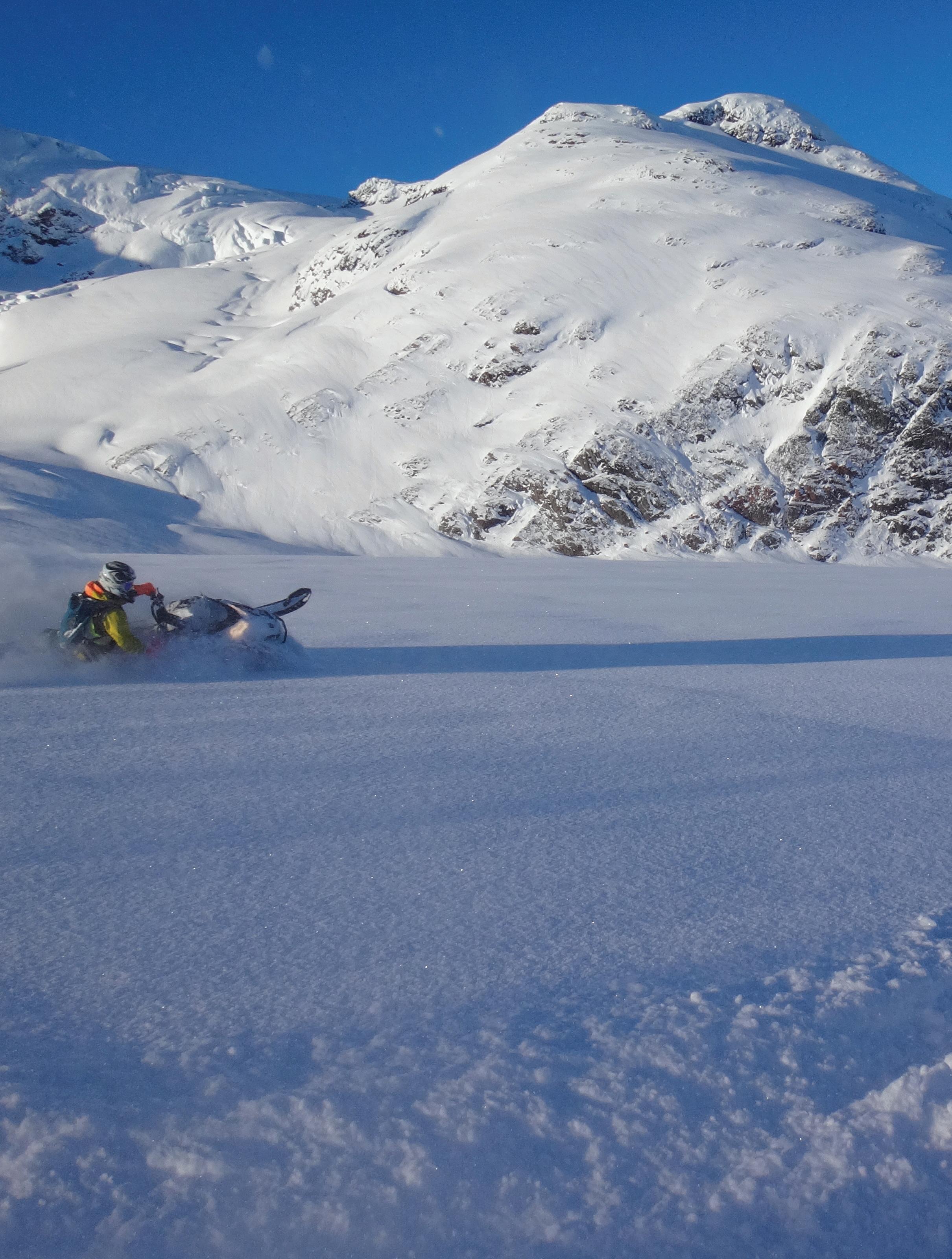
A family deeply connected to the cause recently made a heartfelt donation. Lazar Velev contributed in memory of his brother and several friends who died in an avalanche in 1997.
"We are honored to support the training and resource programs that Avalanche Canada has developed and supported,” said Simone and Lazar Velev, who organized a fundraiser for their son’s first birthday. Named in honour of his late uncle Alex, the birthday fundraiser was a tribute to both his uncle’s memory and the cause that aims to prevent such tragedies. "We had tremendous support from our friends in the community and were privileged to get a company match through my employer and Benevity," says Lazar.
Benevity, a platform that facilitates corporate giving, played a crucial role in maximizing the impact of this donation. The matched donation highlights the importance of community and corporate support in furthering the mission of Avalanche Canada.
Avalanche Canada Foundation
Executive Director Jeff Storck expressed deep gratitude for the donation. "This contribution not only honors the memory of those lost, but also fuels our ongoing efforts to enhance safety and awareness for backcountry users. We are deeply moved by this family's generosity and commitment to our cause."
The Avalanche Canada Foundation awarded the following grants during the 2023-24 season:
Al Hodgson Memorial Fund
• Two awards totalling $1,500.
Craig Kelly Memorial Fund
• One award totalling $1,000.
ISSW Fund
• Two grants of $3,000 each.
Hugh & Helen Hincks Memorial Fund
• $15,000 toward avalanche youth education.
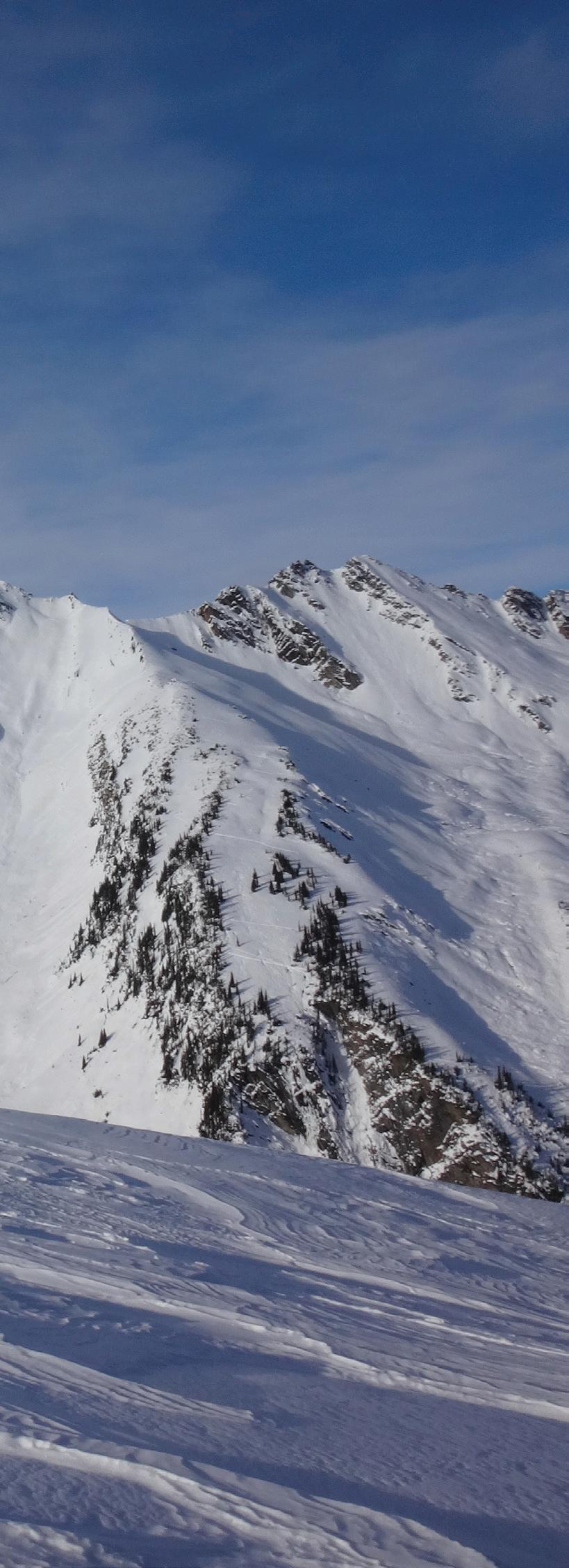
The Avalanche Canada Foundation has seen continued benefit from having an Executive Director coordinating fundraising efforts. Our virtual fundraising events have continued to see strong support, and we were buoyed to host a successful in-person fundraiser again in Calgary in the fall.
A grant received by the Foundation from the Province of British Columbia in late 2021, combined with a federal endowment from 2019 (both held in trust for Avalanche Canada) has allowed the Foundation to further its long-term support of avalanche-related programs and services delivered by Avalanche Canada.
While federal and provincial funding covers core operations, donations allow us to expand our reach and impact. They help bring more education programs to schools, provide outreach to new communities, and increase the capacity for training new backcountry users to stay safe. Moreover, federal funding is finite, and we rely on donor support to sustain and grow our programs. Given the sustained rise in winter backcountry use and escalating costs, Avalanche Canada will continue to need increased resources to support public avalanche safety in Canada. Our fundraising activities continue to be a critical pillar in supporting Avalanche Canada. Fundraising 119,122
$236,135
$268,726
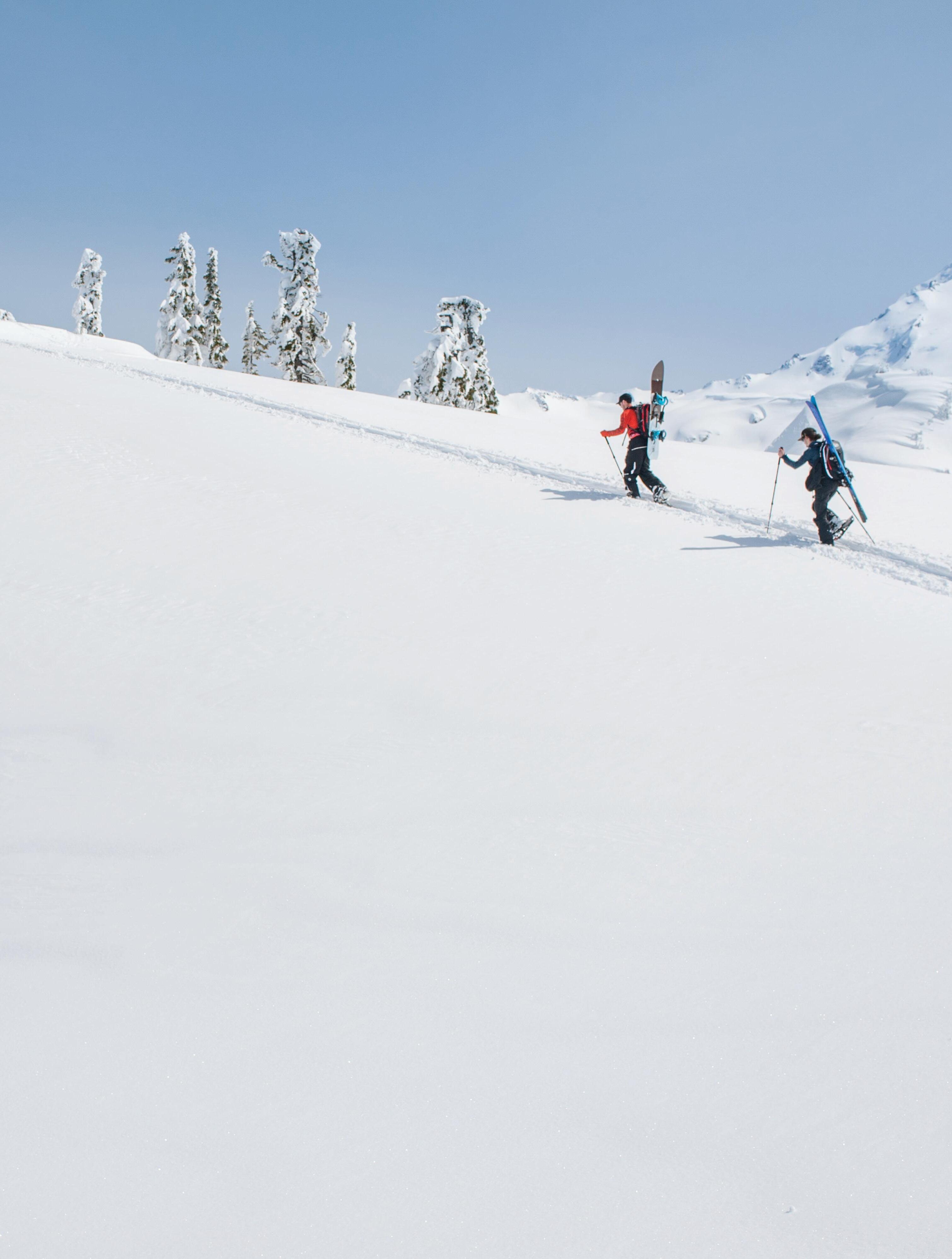
President
Fabian Karg
Vice-President
Keenan Cannady
Executive Director
Jeff Storck
Treasurer
Lyndon Neville
Secretary
Serin Remedios
Directors
Matt Harmsworth, Ted Hincks, Quinn Ingham, William Jackson, Darrell Peterson, Gilles Valade, Kevin Williams
